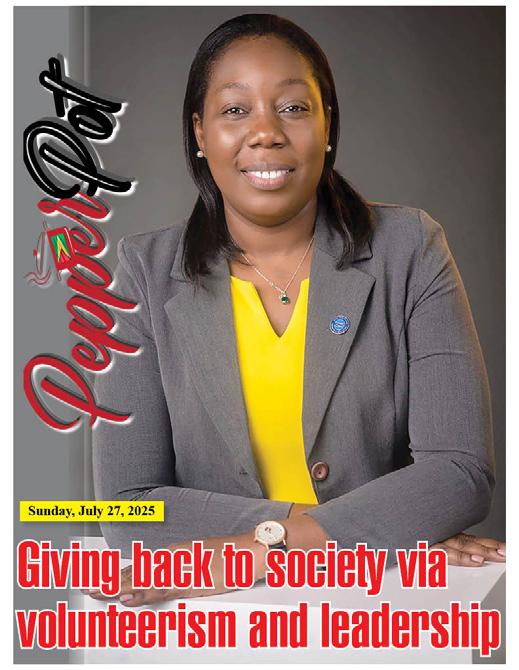



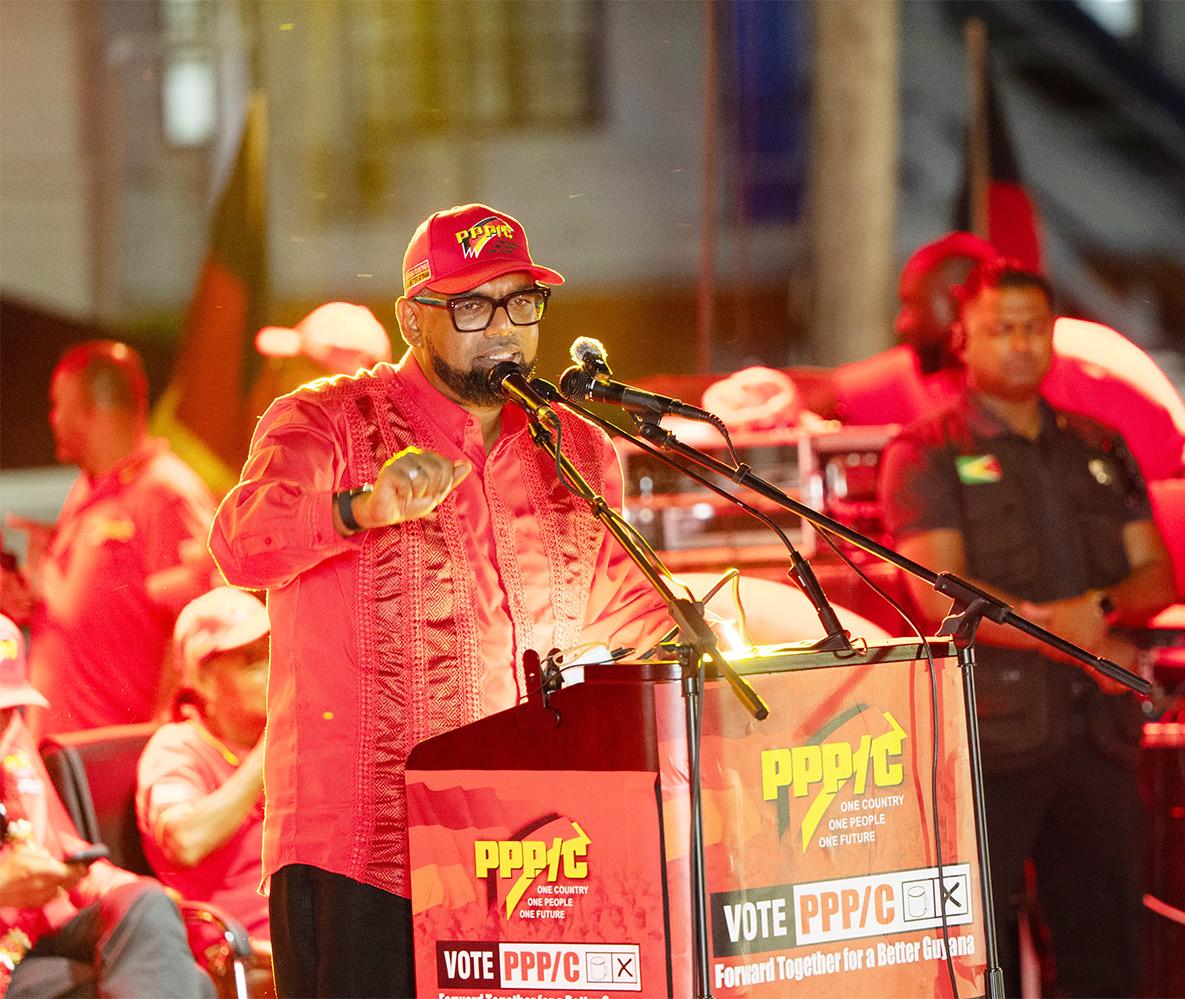
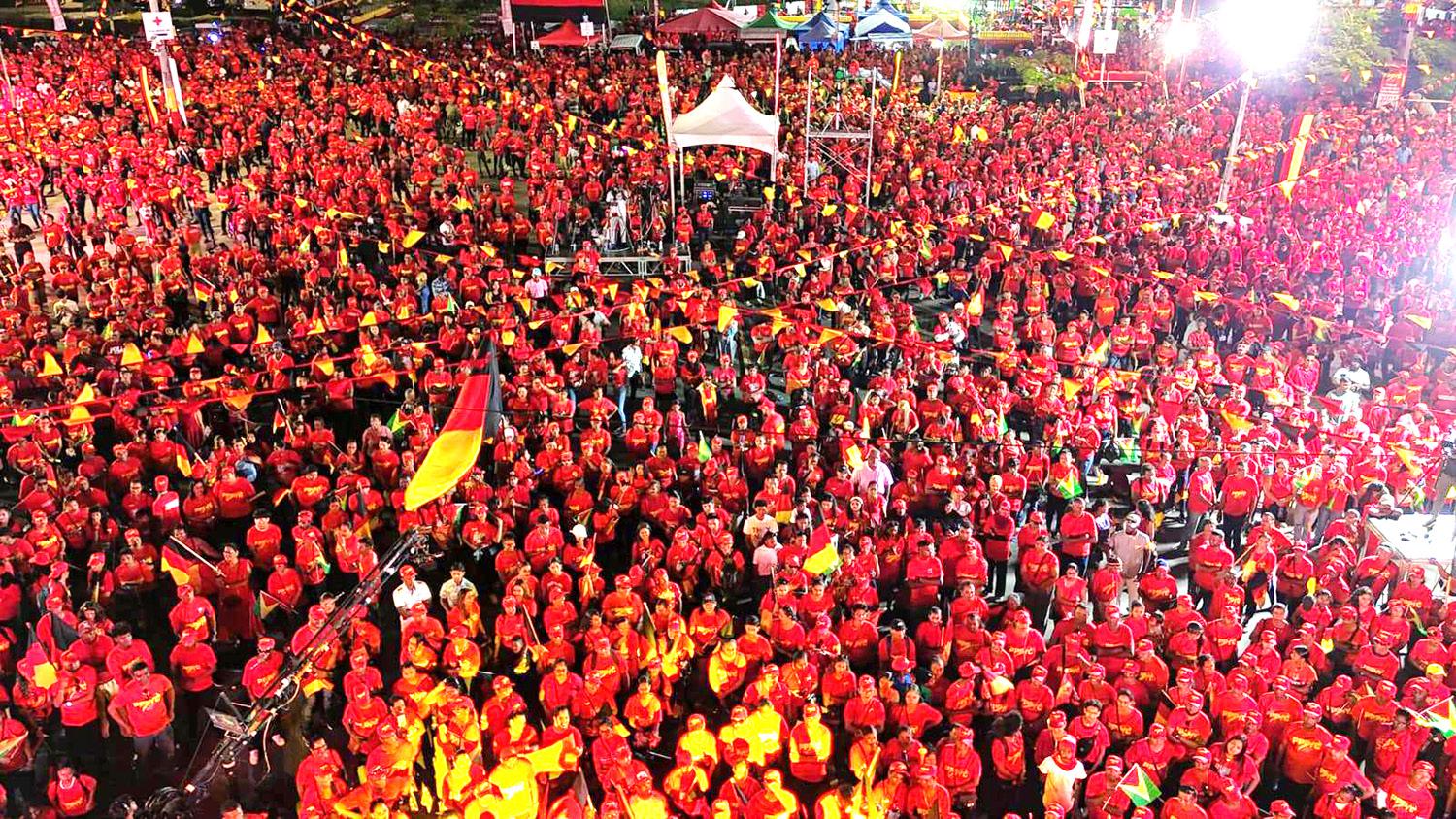











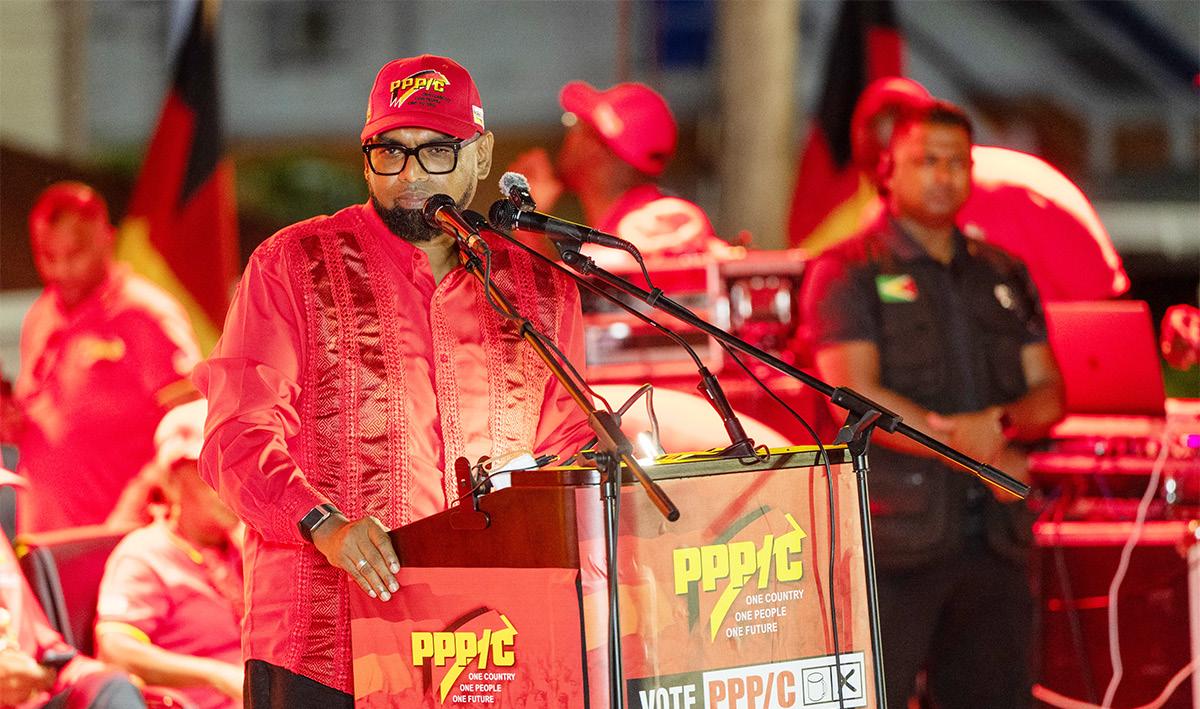
By Feona Morrison
UNDER the evening skies, President Dr. Irfaan Ali delivered a spirited address at the People’s Progressive Party/ Civic (PPP/C) rally in Anna Regina, reaffirming his government’s unwavering commitment to Essequibo and unveiling ambitious development plans for Region Two (Pomeroon-Supenaam) before a mammoth crowd of supporters.
Addressing supporters from a platform surrounded by Vice President Dr Bharrat Jagdeo, Prime Minister Brigadier (Ret’d) Mark Phillips, First Lady Arya Ali, and staunch supporters of the party, President Ali delivered a compelling message of growth and inclusion.
He reaffirmed his administration’s commitment to protecting Guyana’s sovereignty and territorial integrity, accelerating infrastructure, health, education, housing, tourism, drainage and irrigation, and agricultural plans tailored to the needs of the Pomeroon-Supenaam Region.
“When you vote on September 1, you’re voting to protect the sovereignty and territorial integrity of our country,” Dr. Ali said, as the crowd erupted in screams of “yes” and waved the Guyana flag with pride.
He emphasised that his government’s approach to development goes beyond short-term fixes or political promises. Instead, he outlined a long-term vision rooted in sustainability, opportunity, and generational impact.
“Development is not about now alone. It is about tomorrow... It is about five years from now.
“Development calls for ideas and policies and programmes
that will ensure success — not for one day, or one season, or one year — but for a lifetime. And that is the development we are pursuing,” Dr. Ali noted, prompting resounding applause.
President Ali outlined a bold and inclusive vision for the future of Region Two, placing education and human capital development at the heart of his government’s agenda.
Acknowledging Essequibo’s strong academic performance in the Caribbean Examinations Council’s (CXC) examinations over the years, he announced transformative investments designed to provide the Region’s children with world-class opportunities without needing to leave their home.
“Over the last five years, more than 4,000 scholarships [were] given to your children of this region. Every single teacher who wants to be trained can be trained from right here in this region,” he said.
The president added, “Every person who wants to pursue a career in nursing can be and will be trained right here in your region. Your government will invest in the labs and have a medical school right here in Essequibo, so your children can be doctors right here.
“We will be investing in all of the facilities so that you can have a Faculty of Engineering right here in Essequibo, so your children can become engineers right here.” The faculty will be part of the University of Guyana.
SUPPORT FOR RICE FARMERS & AGRICULTURE
The Head of State reaffirmed his government’s unwavering commitment to Essequibo’s rice farmers, emphasising a broad and forward-looking agricultural
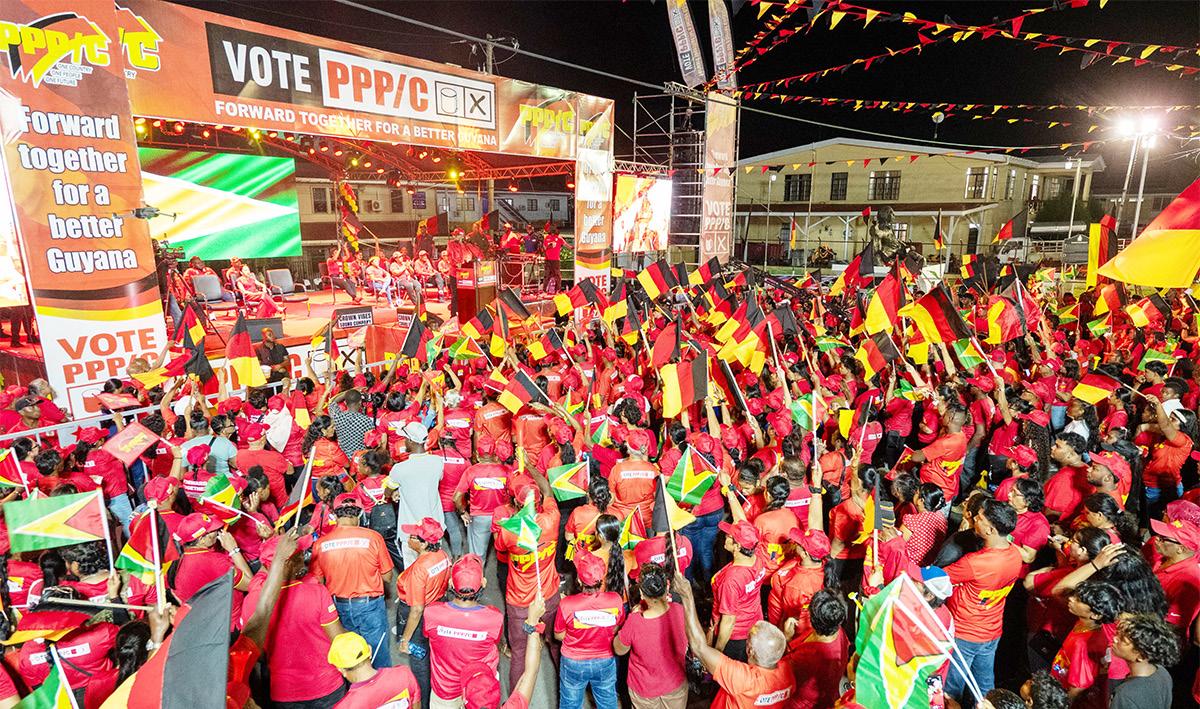
plan.
He reminded the crowd that when the rice industry was in trouble, it was the PPP/C that stepped up, not only by providing $300 more per bag when prices collapsed, but also by supplying seed paddy, fertiliser, and introducing crop insurance to protect farmers.
Dr. Ali detailed a comprehensive strategy focused on investing in drainage and irrigation systems, improving farm-to-market access roads, and reducing input costs.
He announced plans to build a fertiliser plant that farmers can co-invest in, establish a pricing stabilisation fund, and ensure timely payments at the end of each crop cycle.
Furthermore, the government will invest in opening new lands and supplying modern equipment and machinery to boost productivity and income for rice farmers.
“We want to increase your income from farming, reduce your cost, and make it more modernised, so you can farm in dignity, honour, and pride,” Dr Ali declared.
President Ali emphasised the revitalisation of key agricultural sectors and called on voters to support the regrowth and rebirth of the coffee and cocoa industries. He also pledged more support for the citrus industry.
He explained that with the new port facility at Charity, farmers will have better access to Caribbean markets for their produce. Dr. Ali noted that previously there were only one or two boat trips per day, and even with the increase to five trips daily, demand still exceeds supply.
He explained that this is why the government recently signed a contract for a new boat to better serve the people in Region Two.
The president announced
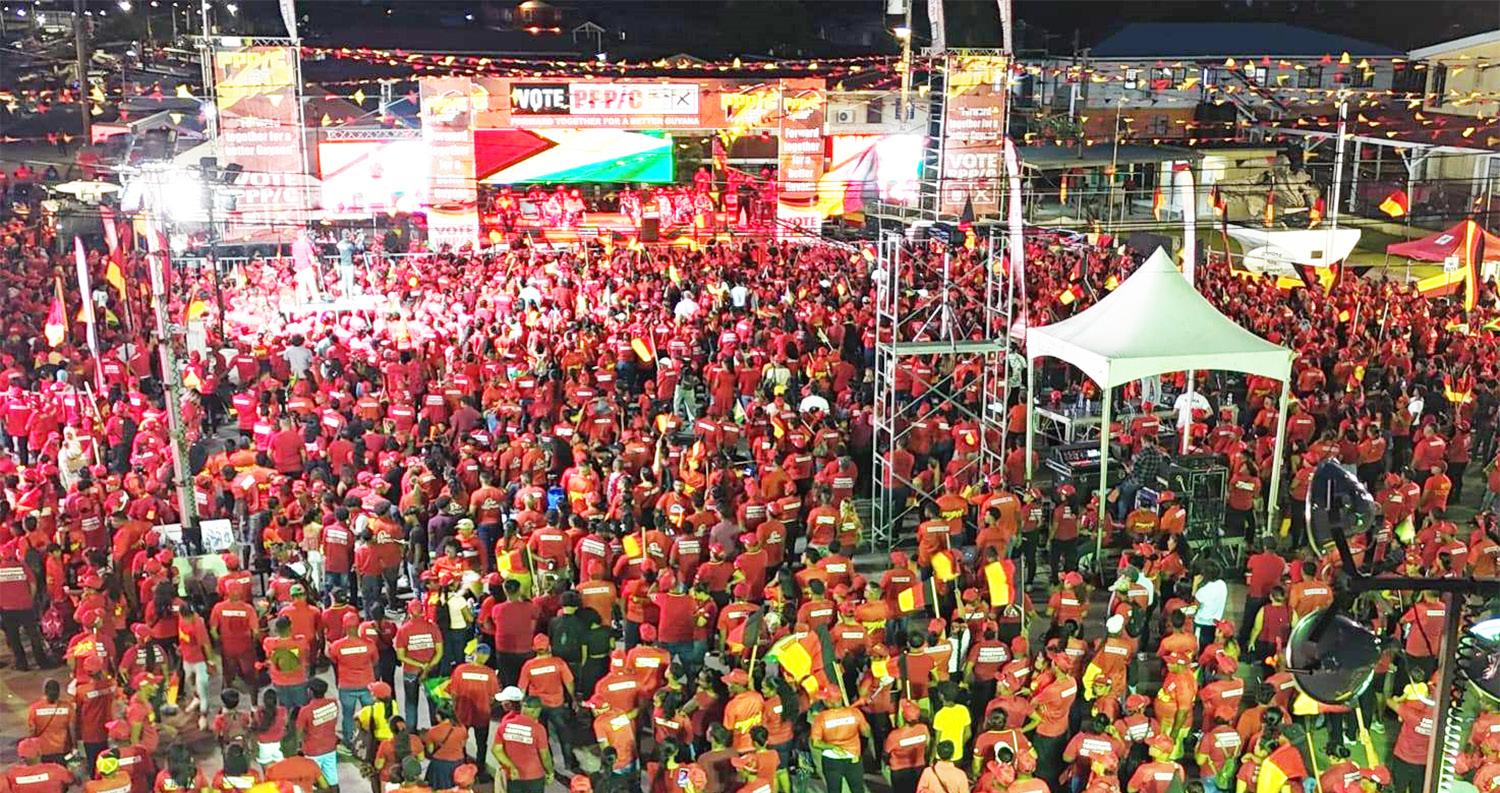
that new cold storage and drying facilities will be established in the region to support and empower local farmers.
President Ali highlighted the government’s commitment to empowering both young people and hardworking families in the region through targeted support for housing and access to essential tools.
“Young people in this region, not only are we investing in education, not only are we investing in health, but we want you to own your own homes.”
“The next five years [will be] about giving you more incentives, more tax deductibles, more support and subsidy so you can build and own your own homes and support your family right here.”
He also reiterated significant tax relief measures aimed at empowering hinterland and riverine communities. By removing taxes on all-terrain vehicles (ATVs), all-wheel drive vehicles, and outboard engines up to 150 horsepower, as well as substantially reducing duties on fourdoor pickups, the government is making essential tools and transportation more accessible to support productive livelihoods.
“We are going to bring the duty down on four-door pickups substantially so that you can use that in your productive life,” he said.
MODERN
In its next term, the PPP/C government plans to expand healthcare services and deliver even greater relief to the people of Essequibo, President Ali said.
“When you vote on September 1, you’re not only voting for more support for dialysis patients, you’re voting for a modern dialysis facility to be built
here in the region to support the people who need it,” he stated.
At present, dialysis patients already receive an annual cash grant of $600,000 under the PPP/C administration, but the president pointed out that the goal is to go beyond financial support and invest in critical healthcare infrastructure within the region.
President Dr. Ali outlined a robust plan to boost small businesses and strengthen financial support for families in the region. He stated that the upcoming vote on September 1 is a chance for citizens to back initiatives that will provide greater financial assistance, promote co-investment opportunities, lower bank interest rates, and create a more efficient system for doing business with the government.
“When you vote on September 1st, you're voting for prosperity,” President Ali told the roaring crowd. “You're voting for stronger support for small businesses, for more money going directly to your families. You're voting for co-investment opportunities, for lower interest rates at the bank, and for a better system to help you do business with the government.”
Dr. Ali emphasised how, compared to five years ago, the region has seen significant investment in public infrastructure, directly benefiting residents’ quality of life.
He drew a sharp contrast between the progress made under the PPP/C in the region and the record of the previous A Partnership for National Unity + Alliance for Change (APNU+AFC) coalition government, which he said plunged the region into a deep sleep and showed no concern for the people of Essequibo.
He criticised the former coalition government for implementing a wide range of taxes that placed a heavy burden on families and reduced their standard of living. President Ali also highlighted the ongoing transformation across the region, pointing to the construction of key infrastructure, such as hotels, a new police station, fire station, government facilities, hospitals, improved road networks and the multi-purpose stadium now under construction.
VOTE PPP/C
As he urged supporters to cast their votes for the PPP/C, he reminded them that they are voting not just for development but for their honour and dignity.
He stated that a vote for the PPP/C ensures ongoing support, including a transportation grant for schoolchildren, increased pensions, increased stipends and expanded opportunities for Community Service Officers (CSOs), and the development of both the tourism sector and an industrial hub in Region Two, among other initiatives.
He added that the region will be designated as a special investment zone with preferential tax incentives to directly support investors and attract even more investment to the area.
In closing, he urged voters to reject the bribes offered by other political parties and support the PPP/C for long-term development and prosperity.
“So, for those who are still indecisive, for those who are still thinking about why you must vote and why you must support the PPP/C, for those who are still thinking... it is about your life. It's about your empowerment. It's about raising the quality of life for every single Guyanese. It is about protecting our country,” Dr. Ali affirmed.
‘You can’t rest your future in the hands of a bunch of misfits’
- Dr. Jagdeo urges Guyanese to stay on the positive course with the PPP/C gov’t
By Trina Williams
GENERAL Secretary of the People’s Progressive Party (PPP) and Vice-President Dr. Bharrat Jagdeo has warned against jeopardising Guyana’s progress by entrusting one’s future to “a bunch of misfits”.
The Vice-President made the foregoing remarks late Saturday during an election rally at the Anna Regina Car Park in Region Two (Pomeroon-Supenaam). He was joined at the podium by President Dr. Irfaan Ali, Prime Minister Brigadier
(Ret’d) Mark Phillips, and other senior government officials.
Speaking to thousands of roaring Guyanese, Dr. Jagdeo, in a fierce and unapologetic speech, took direct jabs at the Opposition and the third forces that are attempting to align themselves as independent, including US-sanctioned businessman Azruddin Mohamed. With the September 1 polls rapidly approaching, this is no time for the electorate to be seduced by fantasy economics or be bought by handouts that some political parties are resorting to,
the Vice-President emphasised.
He highlighted the brazen theft of the PPP/C’s ideas by the ‘We Invest in Nationhood’ (WIN) political party spearheaded by Mohamed. WIN launched its Manifesto for the 2025 General and Regional Elections on Thursday last, and aside from the document being chock-full of recycled PPP ideas, Dr. Jagdeo pointed to the executives fumbling over elementary questions during their engagement with the media.
“You think you can rest the future of your children in their
hands? A bunch of misfits?”
Dr. Jagdeo asked of no-one in particular, voice dripping sarcasm. “They have no experience whatsoever to manage anything! To do anything! And they're all going to face sanctions!” he warned ominously.
Dr. Jagdeo pegged the political ambitions of the sanctioned businessman as an attempt to save himself, especially from egregious crimes levied against him by the Office of Foreign Assets Control (OFAC) of the US Department of the Treasury. “One party stands way
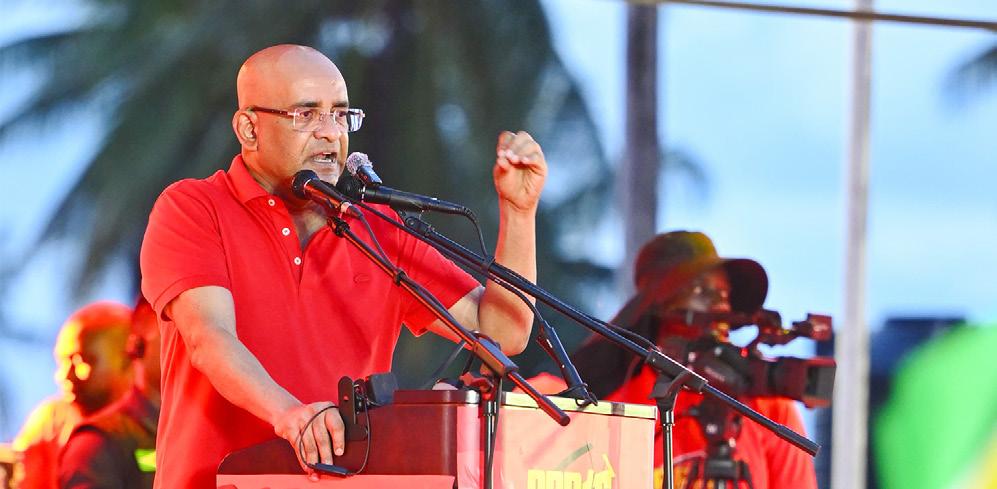
above all the other parties, and that's the People's Progressive Party!” the VP declared. “And that is why, come September 1, the PPP will win an overwhelm-
PRIME Minister Brigadier (Ret’d) Mark Phillips on Saturday urged residents of Region Two (Pomeroon-Supenaam) not to be misled by false promises from political opponents, declaring that only the People’s Progressive Party/Civic (PPP/C) has consistently delivered for the people.
Speaking to a mammoth crowd at the Party’s elections rally at Anna Regina, Prime Minister Phillips reminded residents of the PPP/C’s strong track record in governance, especially in supporting farmers.
“The PPP/C has the farmers at heart, whether it’s rice farmers or those growing crops in the
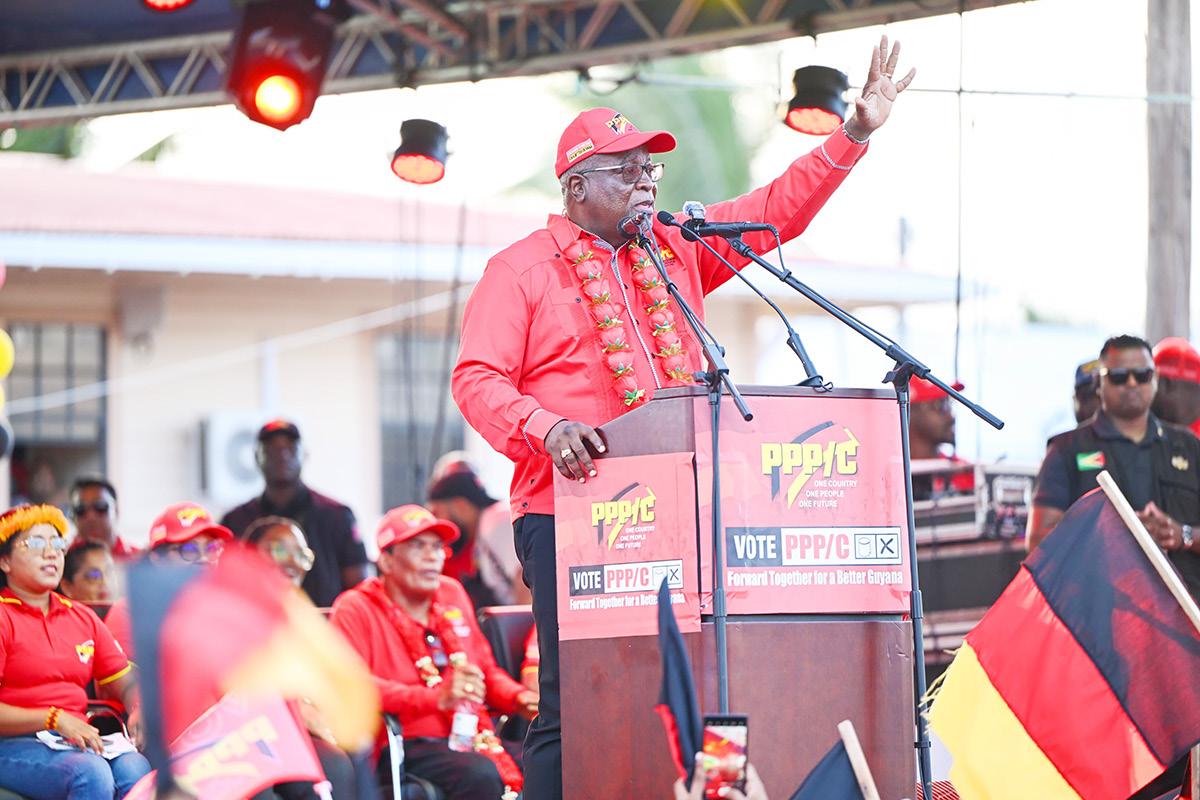
Pomeroon,” he stated, reaffirming the government’s commitment to the agricultural sector.
Phillips emphasised that the PPP/C stands on a solid foundation, citing the widely applauded “Because We Care” cash grant as a direct example of people-centered leadership.
“The PPP/C delivers, and every Guyanese is getting $100,000,” he told


the cheering crowd. “More is coming! As a government, the PPP/C remains people-centered, and we believe that the people should get more.”
He took aim at opposition parties, criticising their history of broken promises, especially to rice farmers.
“Rice farmers were promised in the past by political parties who never delivered,” PM Phillips said, adding:
“We have a government that is watching your back! So, you want to risk any other government?”
He pointed to major projects already underway, noting the tangible progress across the region, including the upcoming 8-megawatt solar energy project for Essequibo. He added that farms are currently under construction in Onderneeming and Charity, a testament to the PPP/C’s

focus on food security and rural development.
“Don’t make them come with all the fancy dreams; the ‘WIN’ [political party] will pass wind on you,” he cautioned. “APNU no good; AFC no good.”
Phillips called on supporters to solidify their commitment on September 1.
“We are sending a strong message with this attendance, but on September 1, vote PPP/C; vote next to the cup, so that you can assure yourself of five years of growth, develop-
ment, and shared prosperity,” he said.
He promised even more benefits during the PPP/C’s next term in office. “Five more years will bring more cash grants, more benefits, and improved health and education. The PPP/C will continue to look after you,” he said.
Closing with a rallying call for unity and focus, the Prime Minister declared: “When I look at this crowd, I see your determination; I see your backing for development for the next five years. Don’t let us lose focus!”

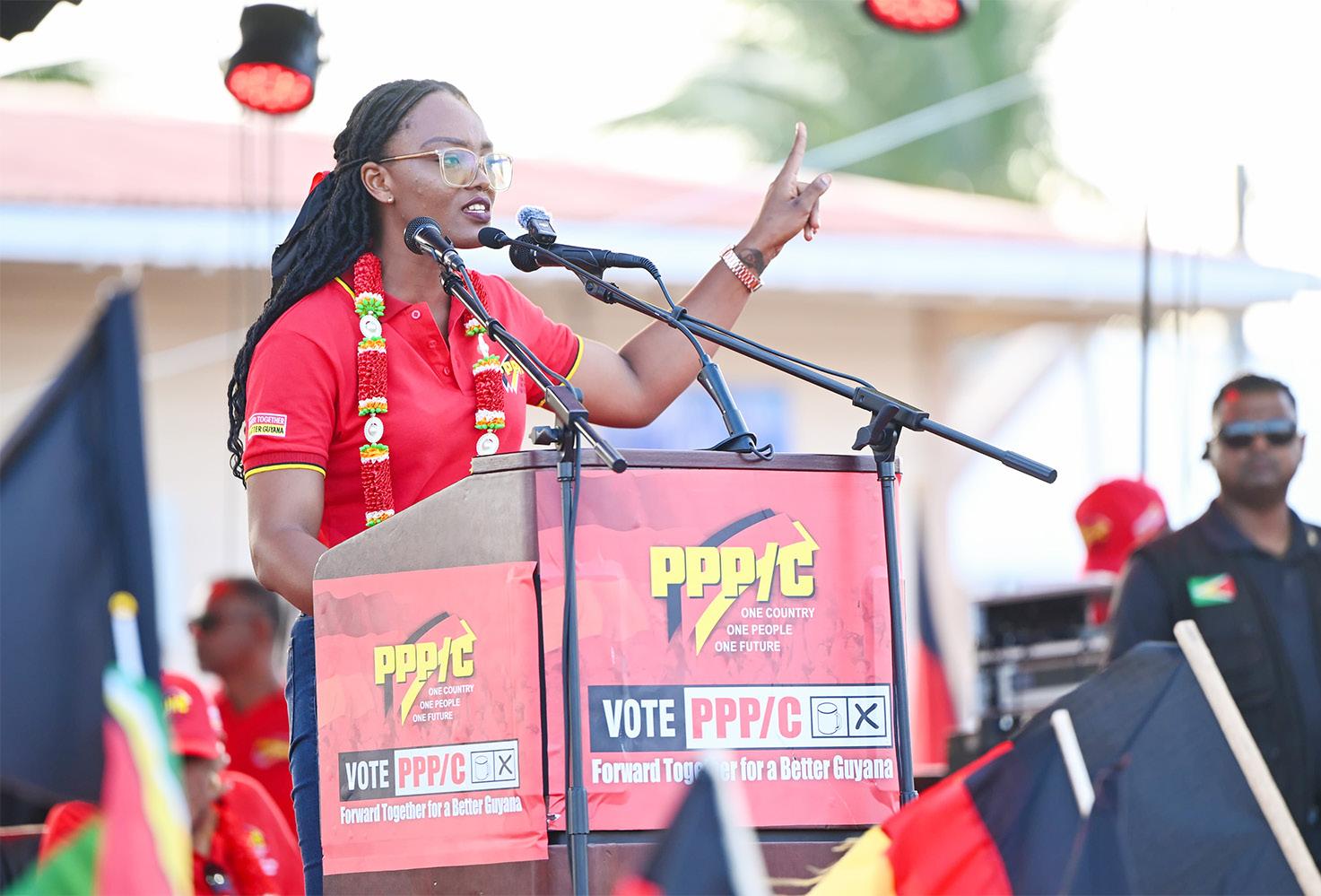

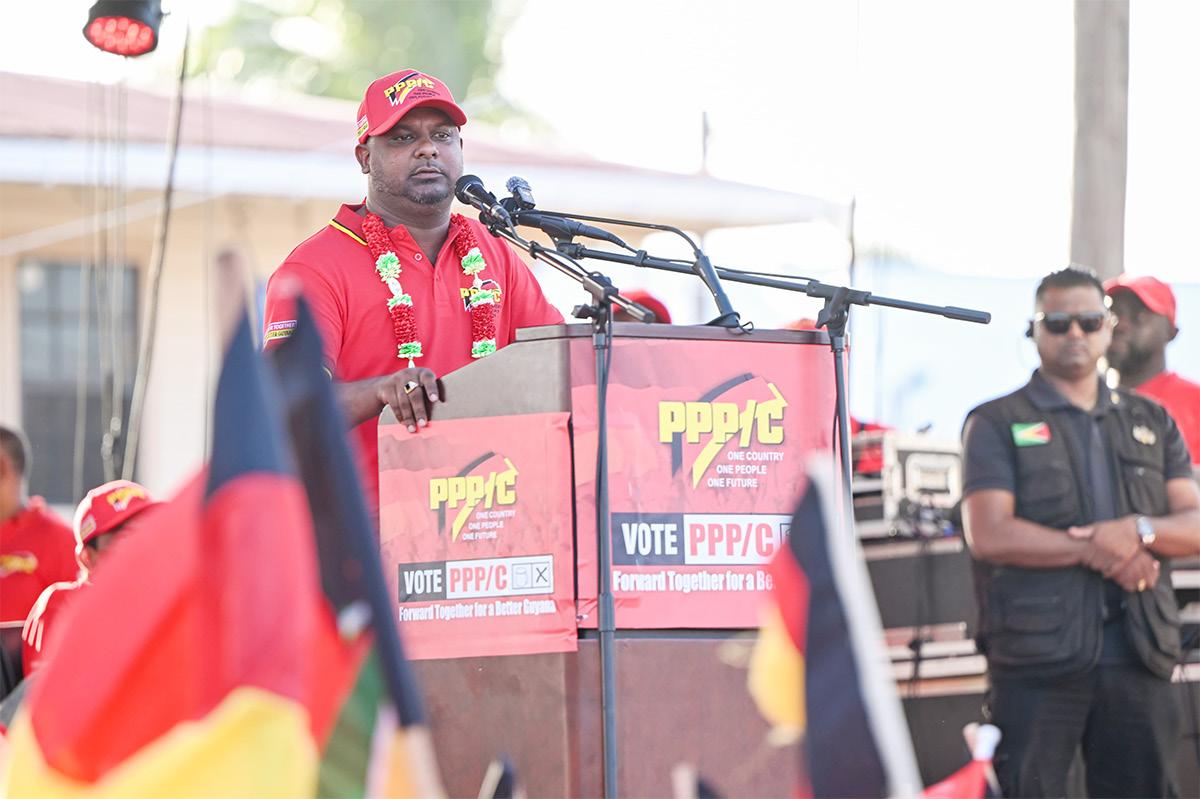
THE People’s Progressive Party/Civic (PPP/C) unveiled a dynamic and youthful slate of candidates during its massive rally at Anna Regina on the Essequibo Coast. Among those who took to the stage were passionate educators, a farmer, and emerging professionals, each representing the vibrancy and diversity of Region Two (Pomeroon-Supenaam).
One of the youngest speakers was Kareena Persaud, a pre-medical student from Queenstown, who confidently addressed the packed audience. As a beneficiary of government-funded opportunities, Persaud shared how these initiatives have shaped her journey. “I didn’t just read about opportunities—I lived them. I’m a proud daughter of this soil, and I stand as proof of what is possible when a government invests in its people, especially its youth,” she declared.
Joining her on the PPP/C’s Region Two candidate list are
other new and dynamic figures: Varshanie Dyal, Sonia Latchman, Azizi Christiani, Tandika Delicia Da Silva, and Gaitree Bharrat, six vibrant representatives of the Progressive Youth Organisation (PYO).
Varshanie Dyal, a young teacher and proud scholarship recipient, captivated the crowd with her message of empowerment. “I am proud to say I am a teacher,” she proclaimed.
“I’ve benefitted from multiple scholarships—opportunities that allowed me to grow and succeed. Just a few days ago, I was awarded my Bachelor’s Degree!”
Dyal emphasised that her journey is not unique but rather reflective of thousands of young Guyanese who have been uplifted by the PPP/C’s investment in education and youth development. “These are not empty promises,” she said. “These are real opportunities changing lives across Essequibo and Guyana. Our youths are rising. Our people are moving
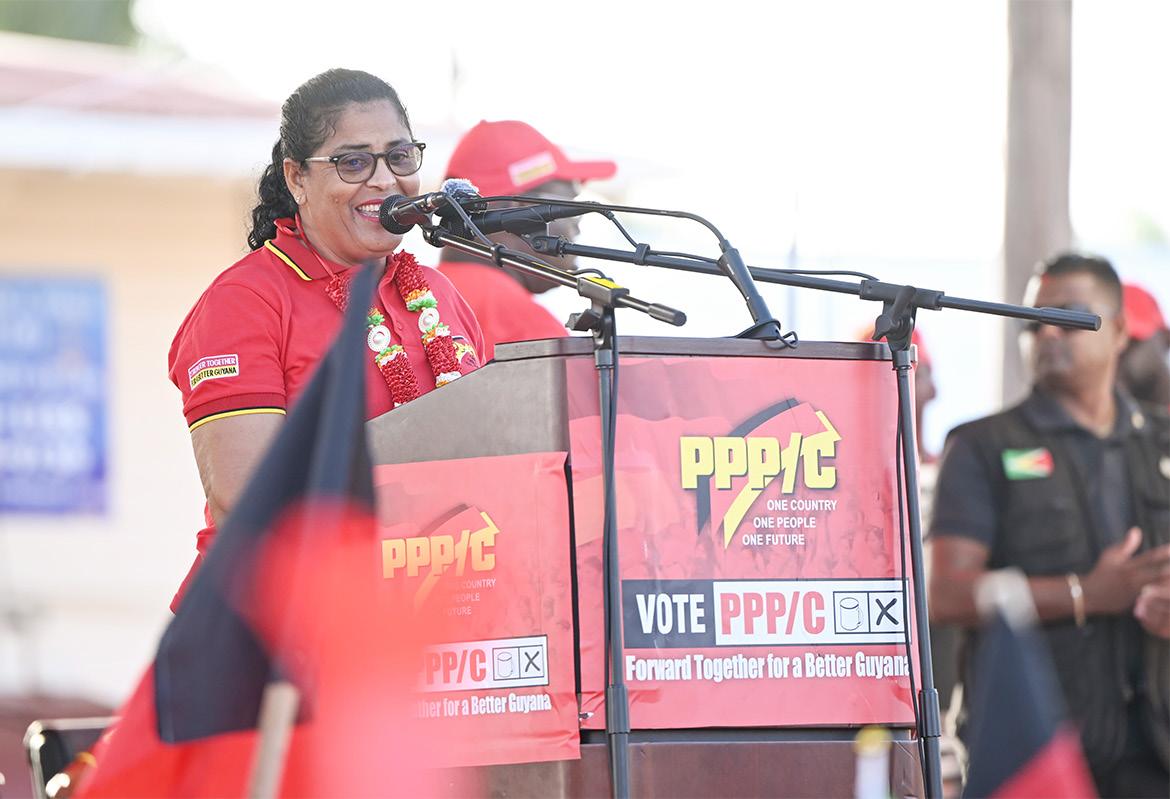
forward. And our country is growing stronger every single day under the PPP/C!”
With pride and purpose, she urged the crowd, “Come September 1st, vote for the PPP/C— the party that includes everyone! The party with strong leadership and youth empowerment! The party that is building our country and your future!”
From Hampton Court, Gaitree Bharrat, a farmer, expressed her unwavering confi-
dence in the PPP/C. She credited the party’s swift interventions in agriculture for saving countless acres of paddy and sustaining livelihoods. “Because of the PPP/C, the rice industry is thriving. I’m endorsing the PPP/C and will proudly vote on September 1,” Bharrat said.
Also speaking was Azizi Christiani, a teacher at Abram Zuil and a sports journalist. He highlighted the strength of the candidates’ list, noting, “I
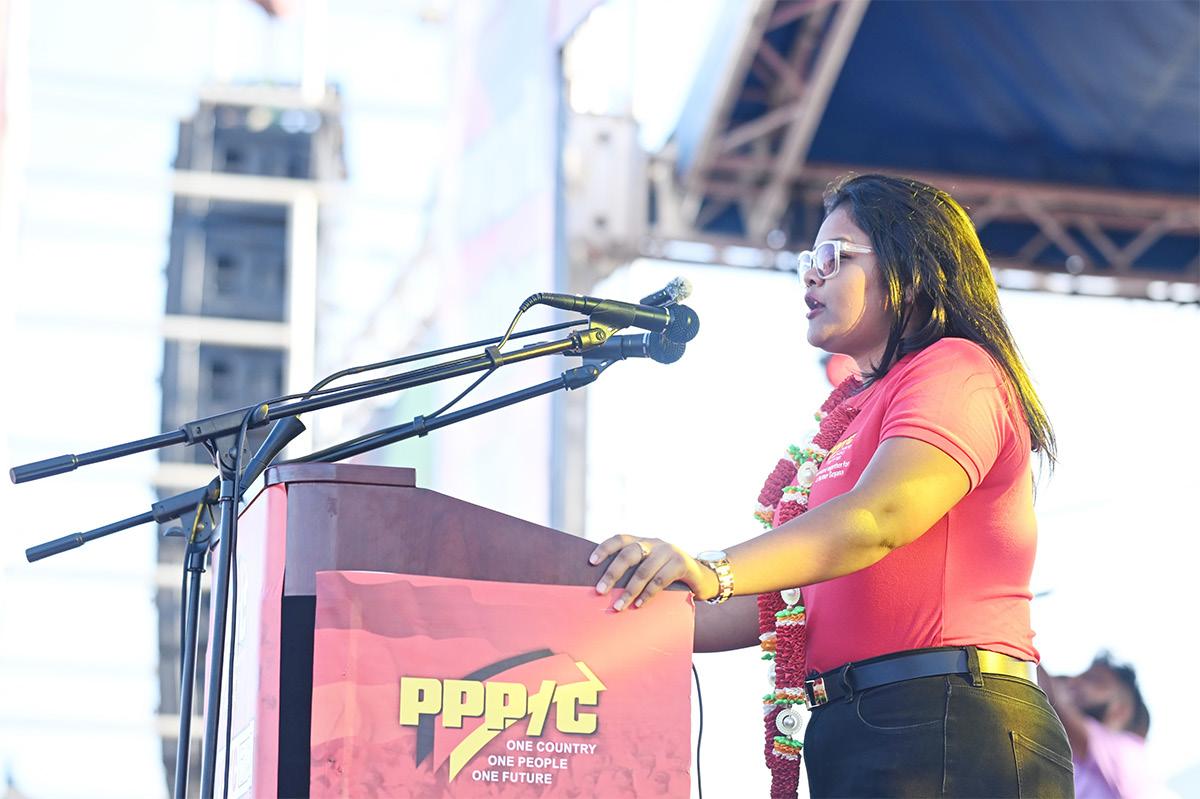
looked at the other parties’ lists, but when I saw the PPP/C’s, I saw vision. I saw representation. I saw leadership.”
Dr. Ranjeev Singh, the region’s Regional Health Officer, reminded the crowd of how far the country has come. “My father could not afford to pay for CSEC exams. Today, every child is writing them free of cost. That’s the PPP/C difference. That is what inclusive leadership looks like.”
Tandika De Silva of the Pomeroon River said that for far too long, Pomeroon farmers were forgotten. De Silva said that under the PPP/C, Pomeroon is developing into the breadbasket of Guyana. She said that over the last five years, the residents have received improved drainage and irrigation; dredging of the Pomeroon River mouth has been done, and farmers are safe from flooding.
FROM PAGE 3
Essequibo will listen to that.”
Turning his attention to President Dr. Irfaan Ali, a tried, trusted and tested leader who stands out compared to other competitors, Dr. Jagdeo not only drew attention to the rapid development that has been unfolding under his astute leadership, but also his unwavering stance on matters of national importance, particularly where the nation’s territorial sovereignty is concerned.
“We are smart people here on the coast and across Guyana; we can't put things at risk. We can't put the future at risk. If you have to go to the ‘backdam’ on that day (September 1), don't go! If you're a rice farmer, go and vote! Make sure you are protecting yourself,” he told residents, cautioning them not to gamble with their future or their children’s.
OPPOSITION’S FAILING LEGACY
While reminding Guyanese not to fall prey to those who are brazenly stealing the PPP’s idea and others who are standing on a dismal track record, the Vice President reflected on the APNU+AFC’s tenure in office, which was marred by hardships.
“I came here in the sad years of the PNC rule, and we saw the desolation on the coast. There were no jobs; every meeting that we went to, people complained that they could not find work,” he said.
Even with the region relying heavily on agriculture, especially rice, Dr. Jagdeo recalled how callous the then APNU+AFC administration was to the farmers, and even pointed to former President David Granger’s statement that “rice is private business”.
He reflected on the PPP/C’s promise while in opposition that should it assume office, it would fight hard to change those grim circumstances.
BRIGHT FUTURE UNDER THE PPP/C
Noting that the opposition talks up promises that would render the nation bankrupt, the vice-president pointed to the PPP/C’s plans to prudently manage the nation, while ensuring citizens get more access to resources. From reversing the 300 burdensome taxes that the APNU+AFC clamped on the backs of Guyanese to the continued expansion in education, health and socio-economic programmes, Dr. Jagdeo
highlighted the country’s bright future under the PPP/C.
Constructing farm-to-market roads, providing more targeted support to farmers, restoring the ‘Because We Care’ cash grant and creating over 60,000 new jobs since 2020 are among some of the numerous achievements by the PPP/C.
“Just imagine the circumstances before 2020. No help to your villages; no help to people in the villages, very few job opportunities, very few access to education. No hope for the future. But all that is changing, because of the investments we are making,” Dr. Jagdeo said, speaking to the Amerindians, in this regard.
However, it is not just
2015-2020, but he pointed to the People’s National Congress/ Reform’s (PNC/R) 28 years of choking Guyana until it became the poorest country in the hemisphere.
“They destroyed our economy, and then in the five years they were re-elected, they tried to steal it again. And that's why we say, ‘Never again; never again!”
Even while battling COVID-19, the country witnessed a new era of development, and according to the Vice President, “You've seen all the changes in Guyana that took place in three years of PPP government, because we lost two to ‘COVID’. Just imagine five more years, what could happen
in this country. We'll transform it. We fulfil the ambitions of our people. Everyone will get help. We've laid out our plans for the future.”
Speaking to the ‘Essequibians,’ the Vice-President made a number of promises, including lower electricity, transportation grants for the school children, and easing cost-of-living burdens even further.
Speaking about how the government has already taken a firm grip on the global impacts of the cost-of-living, he said that only a PPP government would do this because it cares for the people.
The development taking place throughout the length and breadth of Guyana includes
all the nation’s people, as the Vice President said: “Whether you're Amerindian, Indian, Portuguese, or you're Afro-Guyanese, or mixed, we're going to push you very hard to be educated, to get the scholarship to study. We're going to push you to own a home. We're going to help you get a job. We're going to help you start a small business.”
He further told the mammoth crowd that elections are about assessing the past, celebrating achievements and laying out the plans. The PPP/C has done all of those, the Vice President said, noting that the other political parties do not have the nation’s best interests at heart.


PRESIDENT Dr. Irfaan Ali's recent speech to supporters at Industry, East Coast Demerara, highlights a key truth about today's Guyanese politics: there is a clear divide between those who deliver and those who just promise.
His sharp criticism of opposition parties, especially APNU and the new WIN party, shows not just political posturing but a real situation that voters need to think about as they get ready for the September 1 elections.
The President's state -
ment - "if you can't apply the formula, and if you can't apply the theory, and if you can't apply the substance, then how can you resolve the problem?" - has a strong impact when we look at Guyana's remarkable growth.
Under PPP/C leadership, the country achieved an astonishing 43.6 per cent GDP growth in 2024. There were significant investments in education, infrastructure, health and social welfare, among other areas. This is not just a statistic; it represents real change in people's lives through
effective policies. The government's achievements say a lot while the opposition remains silent. The PPP/C has raised public sector salaries by 46 per cent from 2021 to 2025, increased the income tax threshold from $65,000 to $130,000 (taking 60,000 people off the tax rolls), and eliminated more than 200 taxes imposed by the previous APNU+AFC government. These are not just campaign promises; they are real results that have put billions back into the hands of citizens. President Ali's point that oil revenue makes
up only 37 per cent of the budget shows solid financial management that the opposition clearly lacks. While APNU deals with its own conflicts and the AFC fades into insignificance, the PPP/C has strategically used oil wealth to fund 12 new modern hospitals, create 50,000-60,000 jobs, and distribute over 50,000 house lots. Opposition parties keep repeating old complaints about corruption and unfair treatment while failing to offer real policy alternatives.
APNU's lacklustre rallies and poor attendance,
even in places like Bartica where they usually do well, show a political movement running on empty promises instead of actual results. Together with WIN and other parties, their failure to provide clear oil and gas policies, especially when this sector is crucial for national development, reveals a lack of competence.
The PPP/C's 2025-2030 manifesto promises ongoing tax breaks, improved education and healthcare, and smart economic diversification—all based on their proven ability to deliver results. This is not about
theoretical governance; it’s about continuing a successful approach.
As President Ali pointed out, elections are serious choices about the country's future. Voters in Guyana must decide: should they reward proven ability and real progress, or take a risk on opposition parties that seem to focus on criticism rather than effective governance?
The PPP/C's transformation of Guyana from concepts to real outcomes offers the clear answer that any sensible electorate should accept.
Dear Editor,
THE prospect of Azruddin Mohamed entering government must be treated not just as a domestic political issue, but as a matter of national security, international compliance, and economic survival. His candidacy carries severe implications for Guyana’s relationship with the United States and the broader global financial system.
Mohamed has been sanctioned by the U.S. Treasury Department’s Office of Foreign Assets Control (OFAC) for large-scale gold smuggling and money laundering. Association with a political party led by an OFAC-sanctioned individual raises significant red flags under international Anti-Money Laundering and Countering the Financing of Terrorism (AML/CFT) standards.
As soon as someone is listed on a political party’s slate, they are classified as a Politically Exposed Person (PEP)—a designation that drastically increases scrutiny under
AML/CFT law.
But it doesn't end with the individual; the law also covers close associates and family members. In Mohamed’s case, the PEP classification comes layered with the gravity of U.S. sanctions—one of the highest-risk categories in the global compliance framework. OFAC has only about 17,000 sanctioned names out of 7 billion people globally. Being on that list is no trivial matter.
In 2014, Guyana was grey-listed by the Financial Action Task Force (FATF) due to failures in updating its AML laws. We were at the edge of financial collapse. The risk of full blacklisting led to the 2015 snap elections. Had that blacklisting occurred, Guyana would have faced economic consequences similar to Venezuela’s—pariah status in the global banking sector, a collapsed currency, and limited ability to trade. Do we really want to flirt with that fate again?
Those who claim government victimisation of Mohamed and his
businesses ignore the facts. The state could have legally frozen all his assets under the AML/CFT Act following the OFAC sanctions, but chose restraint instead—allowing him to close accounts and withdraw funds. The narrative of political persecution is not only inaccurate but dangerously misleading.
President Irfaan Ali has emphasised that Mohamed’s sanctioned status poses a serious threat to Guyana’s financial integrity, diplomatic standing, and national security. Countrywide banks have reportedly closed all accounts linked to his enterprises to avoid legal or reputational exposure.
Additionally, commercial insurers and financial institutions have refused to transact with him. This isolation underscores how Mohamed's ascent into public office could jeopardise international banking relations and our broader economic system.
Moreover, Guyana's strategic reliance on U.S. support in safe-
guarding its territorial integrity— especially in light of Venezuela’s ongoing border claims—could be imperilled. President Ali has been clear that the U.S. has linked national security to diplomatic co-operation, and Mohamed’s political rise risks undermining these ties. As he stated, our national security is linked to our relationship with key allies like the US in defence of our border.
Further complicating matters, U.S. congressional voices have raised alarms. Representative Carlos Gimenez has warned that Mohamed may be a “pro-Maduro puppet,” calling attention to fears of Venezuelan interference in Guyana through a sanctioned political figure. FARA filings show that a U.S. lobbying firm, Continental Strategy LLC, actively promoted communications to amplify these concerns—urging attention on risks related to Venezuela and authoritarian influence. Including a recent interview
with U.S. ambassador Nicole Theriot, stating how concerning it would be if he were in government, as this would basically hinder any growth with Guyana further, since the U.S. would be unable to do anything with him.
Given these facts, Mohamed’s potential rise to power is not a mere domestic matter—it directly influences our standing with the United States. In the worst-case scenario, we could face more expansive financial sanctions, restricted access to U.S. aid, investment, and co-operation on security and economic fronts.
In contrast, a government led by individuals without such encumbrances would be better positioned to sustain and deepen diplomatic and financial co-operation with the United States. It’s essential that voters consider these long-term stakes before casting their ballots.
Sincerely, Brian
Azore
Mr. Travis Chase, in service to an unacceptable politician in Guyana, did what was required of him. Travis Chase is not a politician. He is not asking you to vote for him.
Chase has the unlimited luxury of saying anything nonsensical, unsavoury, propagandistic, semi-civilised, profane, comical, frightening. He is not asking for your vote. When you urge people to vote for you then, you have to live a life that is the opposite to Chase’s. You have to think straight, behave rationally, display leadership qualities, speak about racial equality, come across as a serious human that has a mind that is filled with understanding for the peoples around you and the country you will lead.
Three developments have taken place recently that should encourage you not to give your vote to any of the oppo-
sition parties. One took place on Friday, the other on Thursday, the one other last week. I will analyse each, beginning with the Friday episode.
Mr. Chase screamed that sanctions are coming against some sitting Cabinet ministers. Mr. Chase was helping his political patron; can you blame him for that?
Opposition politicians ran wild with Chase’s water gun and began putting real bullets in Chase’s toy. It was a gigantic display of political stupidity and lack of commonsense. There are no sanctions coming against the ministers.
But surely, the average person cannot denigrate opposition figures in an election campaign if they say fictional things about the incumbent. That is part of the game. But pick carefully the fictional things you are going to say.
I will offer one com-
monsensical example as free advice to the opposition. Go back in history and invent something against the incumbent that will not embarrass you. But how can you select a fiction that will make you look silly in days to come? And as the election nears the finishing line, your credibility will be lying on the ground because between now and the finishing line no one is going to believe what you say.
As it stands at this moment in the election campaign, the Chase infantilism has shown that the opposition personalities that want to run this country have no access to strategic thinking and are unfit to administer the fantastic economy of Guyana. Voters need to reflect on their stupidity over the Chase clownish act and vote against them.
Next is Nigel Hughes. I cannot believe Nigel has dete -

riorated so badly that this is the elementary strategising he is incapable of. Who is advising Nigel? In his latest campaign commercial, he urged people to vote for the AFC because the two major parties are crumbling.
This utterance makes no sense and indicates that Nigel has become a sad case of political aridity.
How are the Leviathans disintegrating when Nigel spent unlimited energy the past three months trying to team up with one of the giants, the PNC? Had the PNC not snubbed Nigel, he would have ultimately subsumed his political—and by extension, personal—identity under Mr. Norton’s leadership.
Now, three months is just like yesterday. When did Nigel discover that one of the big two traditional parties, the PNC, is crumbling? In those past three
months, Nigel was living in Guyana. He saw the exodus of top leaders from the PNC.
He saw the stubborn refusal of the bigwigs in the APNU that governed Guyana between 2015 and 2020 to speak even one word in favour of Norton.
Three months ago, the evidence (Nigel is a lawyer, each lawyer has the same middle name - evidence) that the PNC was crumbling was written largely on the political map of Guyana, yet Nigel was hurrying like mad to form a team with the PNC, even agreeing to accept the PNC leader as the presidential candidate. This colossal blunder will cost Nigel some votes among the few hundred that he will eventually get.
Finally, a comical figure in the PNC that the PNC’s prime ministerial candidate, Juretha Ferenandes, says will become the Attor-
ney-General if the PNC wins. I am referring to the infamous lawyer, Dexter Todd. Mr. Todd gave one of the most asinine exclamations in the history of Guyana’s politics two weeks ago, which the anti-government press has given him a free pass on.
Todd told Guyana that a team is here to investigate the Adriana Younge death, but the identity of the team members cannot be revealed. A ghost team will be asking questions of real policemen and civilians about how Adriana Younge died. Seriously, can you give your vote to such a foolish man? I sincerely hope not!
DISCLAIMER:
The views and opinions expressed in this column are solely those of the author and do not necessarily reflect the official policy or position of the Guyana National Newspapers Limited.

Guyana must act swiftly to hold the
Dear Editor,
THE US Government has reportedly made a plea deal offer to the sanctioned businessman Nazar ‘Shell’ Mohamed for his role in gold smuggling and other illicit activities.
Of interest to me is
accountable before it’s too late
the demand for a payment of a 65 million USD fine in addition to jail time.
The US is clearly going after its ‘pound of flesh’ and one must ask if/when the state of Guyana will do the same, for we are the party who were de -
frauded by the criminal enterprise run by the Mohamed duo.
The US government provided five years of data to show the Mohameds defrauded the government of over 50 million USD but more importantly they showed us the blue -
print of the smuggling enterprise and we are able to go back further using declared exports at Guyana ports and import declarations at foreign ports; the 50 million USD is but the tip of the iceberg.
Armed with this information and fore-
going consideration of the plethora of other criminal transgressions, the Government of Guyana must end its sloth in pursuit of prosecution of the duo (political cover notwithstanding) and, act to secure a first lien on
all of the assets owned and controlled by Azruddin and Shell Mohamed before the United States gets the corn and we are left holding the husk.
Faithfully, Robin Singh
ON Thursday last, the We Invest in Nationhood (WIN) party launched its 2025 manifesto, which its General Secretary Odessa Primus declared was “historic.”
The other WIN candidates, Natasha Singh-Lewis, Tabitha Sarabo-Halley, Dawn Hastings-Williams, and Vishnu Panday, read out parts of the party’s manifesto, which covered sectors such as health, education, housing, ICT, crime and security, oil and gas, and agriculture, among others.
WIN Party leader, Azruddin Mohamed, delivered a speech and fielded questions from an alert and informed media. He, along with members of the WIN team, seemed very uncomfortable and agitated by the media’s line of questioning.
Mohamed was saved yet again by his hostile party supporters, who were heckling the media at the event. But the excitement and expectation of a sound plan came to a halt once the pages of the manifesto faced the scrutiny of analysts, politicians, media and ordinary people with a political eye. Firstly, the WIN manifesto lacks originality and ideas that could take Guyana into the future. It proves that the WIN is playing in our faces and is a copycat. By reading the manifesto that WIN has conjured up, anyone with a modicum of sense would conclude it is lazy and a clear
case of intellectual incompetence.
WIN copied the ideas and plans that were already part of the manifestos of the A Partnership for National Unity (APNU), the Alliance for Change (AFC), and the People’s Progressive Party (PPP) last election cycle.
For instance, analysing the WIN plans for the housing development project on page 13 of the manifesto document, the public would get the sense that lower-cost homes, housing design codes, home protection law, and Foundation Assistance Grant are new ideas. No. All of them were copied from programmes piloted by the PPP Government and are actually in place.
The foundation assistance grant is the same as the Cement and Steel Voucher Programme, save and except that under WIN, the public is promised large amounts of cash.
In the education sector, thievery is even more blatant and shameless. All WIN’s plans are the PPP, APNU, and AFC’s plans under a new name. All WIN has done is multiply the sum by two or say they will expand the project. For example, pages 26, 27 and 28 of WIN’s manifesto hardly have any new and groundbreaking ideas. They have the policies that originated with the PPP, such as the school feeding programme, which WIN vows to expand after hearing the PPP
2025 manifesto plans.
WIN shamefully took the PPP 2025 budget measures and said it would increase these by as much as 1000% or double by half. The public could check pages 12 and 13. Nothing is new and bright. No fresh thinking patterns, just highway banditry. WIN dressed all the PPP measures in new clothes with more money. Reading this manifesto was like reading everything that PPP, APNU, and AFC would have already done and have been talking about doing over the last couple of months. Whether it is ending blackouts or distributing agrochemicals, it was done or is being done.
WIN also stole President Mohamed Irfaan Ali’s initiatives and plans that he has been announcing in various regions over the last three months. It will not take a magician to realise that many of the initiatives included in the WIN blueprint on pages 36 to 60 are the President’s ideas. Everything mentioned in the manifesto about AI was first revealed by President Ali.
It is barefaced highway banditry and thievery of the policies and plans of these two political gamechangers, more so the PPP.
Secondly, WIN must identify the individuals or groups it claims to have consulted when crafting this manifesto. When were the consultations held? Where were the consultations? The public is no fool, and they

know bullshit when it is served as cake. Mohamed knows he lied, and these widespread consultations took place in his dreams.
He is bluffing and mamaguying the public. Primus, a comedian, is learning about political acting, while Mohamed is struggling to, at the very least, be a politician who is interested in politics.
They skewed up the launch, and the media were on their case as they should be. After all, Mohamed set the tone for the press launch. He delivered a short speech, which was a heap of nothingness. He continued to deliver scripted responses and one-liners.
To the public, Mohamed was bankrupt of ideas and uninspiring, regardless of the staged party support at the launch. It was painful to watch him crash out, as he had no economic plan or policies that were interesting. He did not defend his suite of plans. He could not give any insight on how he would cost or finance the plan.
Maybe he did not even read his manifesto, and so, he kept deflecting. The truth is this is the work of AI and a group of ‘has-been' politicians and parliamentarians.
Thirdly, no political party would take pride in referring to itself as a victim. Mohamed does this almost every time the media approaches him with difficult questions that require intellectual wit, political knowledge and aca-
demic analyses. He cowered away, pretending the PPP was coming after him politically.
The media should invite him to a debate or discussion of this manifesto, as elections are right around the corner.
If he wants to be president, then he must act like a president and stop hiding under Primus' skirt. He must develop the testicular fortitude to allow himself to be grilled on this manifesto.
Seriously, a National Wind Power and Solar Project to reduce energy costs by 70 per cent? No details as to the project cost or how it will work? And, where is the money coming from?
The manifesto states that 372,000 people live in poverty. Huh? Where did WIN get the figure? This document said that WIN would increase public servants' pay by 50 per cent, but it does not mention where the money would come from. How sustainable is this? What are the fiscal incentives?
A Guyana Transportation Agency? Huh? WIN is not serious again. Reduce housing cost by 40 per cent? An Indigenous credit union was mentioned in the manifesto plans, but there is no other information that explains this policy. WIN manifesto promises to increase carbon credit payout to Amerindian villages.
A whole 38 to 65 per cent of Guyanese women are abused? This is highly questionable information
included to make the WIN manifesto more appealing. Define the role of ministers vs. permanent secretaries. Why? Seriously? WIN is playing in the public’s face. It is not cute.
Finally, American Author Herman Melville, who is a novelist, said, “It is better to fail in originality than to succeed in imitation.” WIN lost many voters on Thursday. Perhaps, WIN’s ideas, plans and policies are gone with the wind because of the patchwork and political assassination of the manifestos, particularly of the PPP.
The WIN manifesto bears a shocking resemblance to the manifesto of the United National Congress of Trinidad and Tobago. WIN must have the maturity to develop plans and policies that are based upon realism and practicality. WIN must have engagements with stakeholders and must do the political work. Surely, the public would take it seriously, and Guyana's youth population would embrace it as the future of politics. For as long as WIN does not show care for the people, it will not make a dent in the local political scene.
DISCLAIMER: The views and opinions expressed in this column are solely those of the author and do not necessarily reflect the official policy or position of the Guyana National Newspapers Limited.
EXXONMOBIL Guy -
ana’s involvement in local sports is anything but new. From the outset, the company has championed athletics from grassroots initiatives to professional leagues. Among the sports that have flourished under this support, cricket tends to stand out.
Much like Guyanese cuisine and humour, cricket is deeply ingrained in the nation's culture. The sport opens the door to massive economic opportunity, fuels national pride, generates
employment, supports small businesses, and uplifts communities. In every sense, it is a cultural force. It is within this context that the launch of the ExxonMobil Global Super League (GSL) was both timely and visionary. Bold, fresh, and as electrifying as the cricket Guyanese know and love, the T-20 tournament has already made its mark. Now in its second year, GSL recently drew a sold-out crowd of more than 14,000 fans at the Guyana National Stadium, where the
Guyana Amazon Warriors were crowned champions for 2025.
The Warriors’ thrilling performance only heightened anticipation for the upcoming Caribbean Premier League (CPL), widely known as "the biggest party in sport."
This isn't just a catchy slogan, it’s a truth passionately lived by cricket fans. Every year, thousands flock to Guyana, draped in gold, green, red, black, and white, to rally behind the home team and chase the dream of lifting the trophy and claiming re-
gional bragging rights.
That momentum carries economic weight. In 2024, Guyana welcomed over 844,000 visitors — a number significantly boosted by CPL festivities. This influx touches every sector. Hotel rooms and B&Bs are booked solid. Taxi drivers and registered transport services clock long hours to keep pace with demand. Food vendors fire up their stoves from dawn to dusk, satisfying cravings for pepper pot, eggball, bake and saltfish, curry, and more. The energy and the economic
boost are undeniable.
But even beyond the numbers, cricket brings Guyanese together in an unparalleled way.
Win or lose, the game is a shared language, a unifier that fosters national identity and pride. CPL and GSL offer not just entertainment, but inspiration, especially for the next generation of athletes who dream of one day stepping onto the field as the crowd chants their names.
That vision is exactly what sustained investment in sport makes possible. Exx-
onMobil Guyana’s continued support of cricket and other sporting initiatives shows that its presence here is not limited to oil and gas. It is a partner in national development — investing in the people, the culture, and the future of the country.
DISCLAIMER: The views and opinions expressed in this column are solely those of the author and do not necessarily reflect the official policy or position of the Guyana National Newspapers Limited.
THE 2020 election rigging trial, which has been unfolding like a slow-dripping faucet, is back in court over the next three days.
While public interest may have waned, a return to the infamous Ashmin’s building this week, the alleged scene of an attempted mugging of thousands of votes cast for the PPP/C, might just help refocus national attention on what was a brazen assault on our democracy.
I say ‘alleged’ out of respect for our legal process, but if the conclusions of the Commission of Inquiry (CoI) have any weight, and they should, the men and women who conspired to steal the elections must be held accountable for their actions.
Some may argue that since the events occurred a whole five years ago, it is time to move on.
Time does heal all wounds, but if there are certain things that time should never forgive, this ought to top the list.
In just over a month from now, Guyanese will head to the polls to cast their votes and elect a government of their choice.
It has a nice ring to it, doesn’t it? It feels much like we are enfranchised, organised, and even civilised, from the Latin root “civilis,” which

relates to being a citizen, not barbarians at the gates of refined and cultured society.
And yet in 2020, a cabal of political operatives aligned with the PNC, APNU and AFC set out to hijack the results of the elections to give the losers a victory. You can pour an entire bottle of perfume on that little fact, and it will still stink long after you’ve taken a swim in the salty Atlantic.
Since serious charges of conspiracy to defraud, misconduct in public office, forging and falsifying Statement of Polls (SoPs), in other words, official government documents, were laid against nine individuals, three are former high-ranking GECOM officials, no one has shown an iota of remorse. You’ve got to admire the tenacity, the sheer commitment of Keith Lowenfield,
Roxanne Myers, Clairmont Mingo, Volda Lawrence, the former government minister and PNC/R Chair. And then there is the PNC/R activist Carol Smith-Joseph and four former GECOM employees - Sheffern Febrary, Enrique Livan, Denise Babb-Cummings and Michelle Miller. After sitting in court and hearing witness after witness testify, there is no sign that any of them are about to break ranks and enter a guilty plea and submit to whatever punishment Magistrate Faith McGusty might hand down. It is not likely to happen either. And if you’re surprised, look at who their lawyers are, mostly men who harbour political aspirations. Men who would want the court and the public to believe that it was the People’s Progressive Party Civic (PPP/C) who
trumped up these charges in the first place to disparage the PNCR-led APNU and the isolated and diminished Alliance For Change party led by Nigel Hughes, the attorney who is leading the defence strategy.
Hughes has been coaching Eusi Anderson to harangue the State’s witnesses with as much invective and bombast as he could muster on any given day to disparage and discredit the eyewitnesses as lackeys of the PPP/C.
Dr. Dexter Todd - his pseudo-intellectual demeanour may fool many - but he plays his part in court, and now Aubrey Norton is dangling a ministerial position in his face. And so, we circle back this week to Ashmin’s building.
The purpose is not to admire its architecture, but rather to give Magistrate
THIS is the fourth time I have been moved to write about sudden death and the way it affects all of those close to the deceased. I have written about the death of my twin son, whose life ended in a car crash, a friend who died suddenly from a heart attack, a young man who died by suicide and now one who was shot down less than two weeks ago.
I attended the funeral of this young man last Friday. I did not know him well and, in fact, met him through the mother of his two children, whose grandmother and I have been close friends for over three decades.
However, when I learned of the young man's death, I was shocked and pained. I immediately recalled the times when I met him and one occasion in particular, when we chatted easily about a range of topics - from the traffic on our roads to the state of politics and religion in ours and other societies.
He had a keen mind. Yet his death was a sudden and violent one, as I understand he was riddled with bullets, following an altercation with those who shot him. He was the only child of his mother and was just 30 years old when he died - the same age as my son, who crashed. I am always moved when I hear of the death of any young person, but I am particularly concerned about those who die violently. These deaths devastate families in especially profound and lasting ways. There is shock, disbelief and emotional and psychological trauma not easily overcome.
Angela Driscoll, a supervisor and mentor to a programme for the families of murder victims, said in an article, "...it is a heinous crime that casts a long shadow on the victim's family and friends and changes people's lives forever."
I saw some of this firsthand as I witnessed the unrestrained grief of the young
man's mother and also the reaction of my friend's granddaughter, who has barely eaten since his death and cries constantly.
His wake was held at several venues, and friends turned out in their numbers to pay their respects. Shock was still mirrored on many faces and could be heard in the voices of those discussing their friend's death. Family members, while putting on a 'brave face', seemed to be moving in a trance, going through necessary arrangements but still processing the tragedy that had confronted them.
We have yet to see the effect of their father's death on the two young children - a five-year-old boy and a two-year-old girl - he leaves behind. I shuddered inside when his young son insisted on writing something of his own alongside the inscription on the wet cement closing off his father's tomb. When he stood back, I saw the word 'dad' and the simple drawing
McGusty a vivid picture of the restrictive atmosphere in the room as the accused before her conspired to limit oversight and undermine transparency during the tense tabulation process.
Where were the observers, party agents and diplomats situated when Myers shouted at them, “Take your rubbish with you and leave, y’all get out the room, there is a bomb in the building.”
Evidence presented in court shows that DCEO Myers knew it was a hoax since she, herself, never thought it was urgent enough to leave the building.
And how about the testimony of Assistant Commissioner of Police (ACP) and Region Four Commander, Edgar Thomas, who arrived at Ashmin’s to investigate the bomb threat? ACP Thomas refused to follow orders to vacate the premises. That refusal cost him his job. On orders likely from former President David Granger, a solid high-ranking police officer was terminated.
ACP Thomas testified at the CoI that he discovered GECOM staffer Enrique Livan in a private room with a laptop computer and a flash drive, manipulating figures at the height of the vote count. While this was happening, he testified, Lowenflied was tabulating Region Four votes
using his own fabricated numbers displayed on a spreadsheet.
One would think this could all be sorted if Magistrate McGusty were to screen surveillance footage from CCTV cameras in the building. Wrong. Chief Elections Officer Vishnu Persaud testified at the CoI that “no video surveillance of the tabulation process within Ashmin’s Building has been located… nobody seems to know when the cameras were removed and where the footage might be.”
What happened inside Ashmin’s building in 2020 was not electoral mischief; it was political arrogance. Guyana today cannot treat this as some kind of administrative hiccup.
Those who tried to defraud an entire nation must be held accountable. Otherwise, we risk sending a message that Guyana’s electoral process is fair game for subversion. That must not happen, not now, not ever again. And the time to deliver that message is on September 1, 2025.
DISCLAIMER: The views and opinions expressed in this column are solely those of the author and do not necessarily reflect the official policy or position of the Guyana National Newspapers Limited.
of his father's face. Many, like me, were touched and moved to tears.
The Marie Curie group in the UK says, "Children react to grief in their own ways... It can take time for them to process what's happened and share their feelings. Every child's reaction is unique and the support they need will be different too."
I would imagine this is particularly true for younger children, who will likely need special care and attention. However, relatively little is known about the full impact of a parent's violent death on young children and so, it is left up to the remaining parent and the family circle to do all they can to cushion what is often long-lasting grief.
Studies nonetheless show that we are all affected by violent death, not just family and friends but the entire community. And we are reminded by GriefLink, a group dealing with violent-death trauma, that "The sudden and violent nature of murder can

lead to particularly intense grief for those directly and indirectly affected by the loss," and can also "evoke strong feelings of anger and a desire for justice."
The 'ripple effect’ is considerable as the experience can also affect personal relationships, social life, work, emotional and psychological health, the way we view the world and even the way we view ourselves.
Let us contemplate this simple, yet profoundly obvious statement by the 15th-century priest and professor, Martin Luther, who
said, "Nothing good ever comes of violence". And these are the more recent words of his namesake, Civil Rights activist and pastor, Dr Martin Luther King, who spoke on the broader impact of violence, saying, " Through violence you may murder the hater but you do not murder the hate."
DISCLAIMER: The views and opinions expressed in this column are solely those of the author and do not necessarily reflect the official policy or position of the Guyana National Newspapers Limited.
SENIOR Minister in the Office of the President with responsibility for Finance and Public Service, Dr. Ashni Singh, on Saturday passionately defended the governing People's Progressive Party/Civic (PPP/C) and its developmental legacy across Guyana.
Speaking at a community meeting in Fort Ordinance, East Canje Berbice, Dr. Singh emphasised that without the PPP/C, communities like Fort Ordinance would not exist, highlighting the tangible impact of the party’s governance on the ground. He noted that every corner of the country is being transformed under the PPP/C’s leadership.
Challenging the opposition to point to their own achievements, Dr. Singh declared, “Show me a single community that exists today as a result of their vision! You will search forever; you will get tired, you will get weary, you will get old!”
He continued his sharp criticism of the former APNU+AFC government, questioning whether they could identify even one hospital they built during their time
in office. According to Dr. Singh, rather than creating jobs, the opposition actively took them away.
“Did you see the 20% salary increase that APNU promised? Instead, you saw the doors; people were sent home.”
The Finance Minister condemned the former administration for firing workers without considering the devastating ripple effects on families, communities, and the broader economy.
“Not for one minute did APNU stop to think about what would happen to those workers, their families, and the entire village. In the history of Guyana, we have never seen a more brutal and callous government than the APNU+AFC,” he said.
Dr. Singh pointed to infrastructural achievements under the PPP/C, like improved connectivity and transportation, all hallmarks of their commitment to modernising Guyana.
“Today, you drive straight across the bridge, and you reach your destination,” he said, adding: “Sometimes we take these things for granted.”
Looking ahead, Dr. Singh
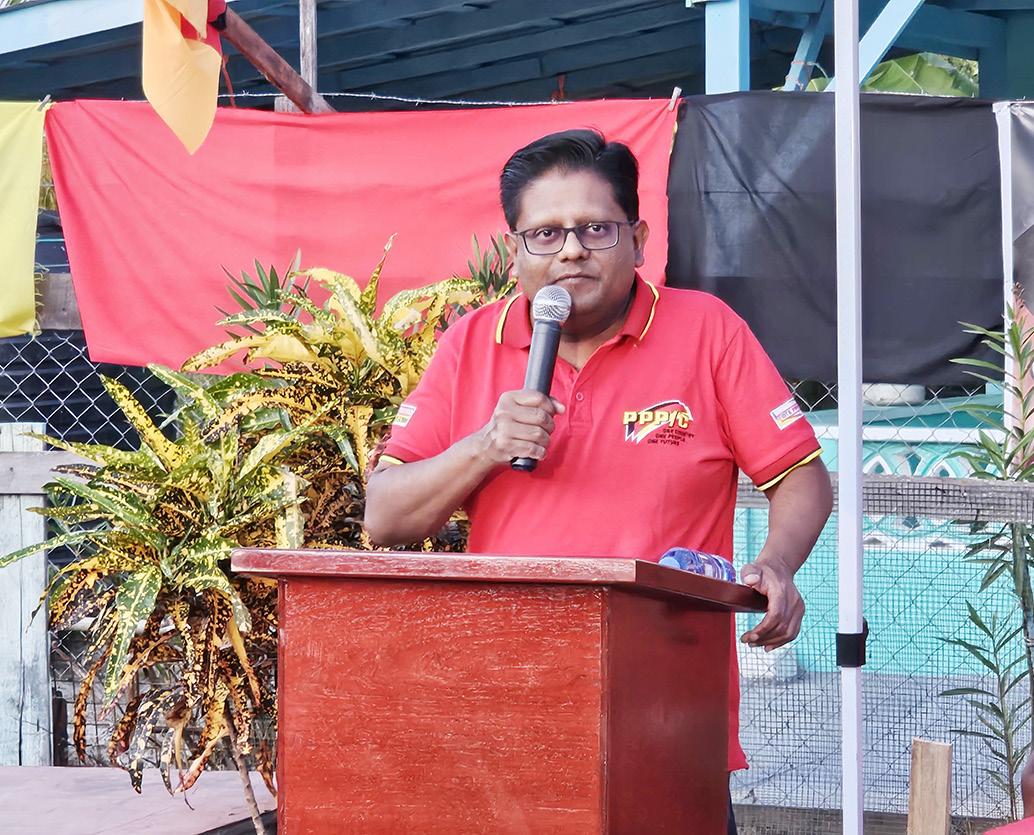

assured citizens that more transformative projects are coming in the next term of office. He outlined the ambitious plans for a new four-lane bridge, continued construction of all-weather roads, and highways connecting regions across the country from Lethem to Brazil and Suriname on the Corentyne Coast.
He credited President Irfaan Ali for this expansive vision, stating that under his leadership, Guyana is experiencing unprecedented national development and regional integration.
“A major international stadium; the people who used to wake up at 4 in the morning and go to Georgetown will now be able to go to Palmyra to watch crick-
et,” he said, adding:
“When you build an international stadium, think about the whole ecosystem around it; the international hotels, the malls, the restaurants, the business opportunities that are created. And who better to take advantage than the people who live right here.”
He told the residents gathered, “You can see that development; it is not a dream, it is happening before your very eyes. When you go past Palmyra, you can see it.”
As such, Dr. Singh said that the future of Guyana is a bright and an exciting one under President Irfaan Ali.
With the gas pipeline project slated to be established at the mouth of the Berbice River, Minister
Singh projected a wave of industrial development that will redefine the economic landscape of the region. He emphasised that the scale and impact of this initiative will be unlike anything Guyana has seen before, describing it as a catalyst for unprecedented success in manufacturing, energy production, job creation, and regional investment.
He noted that the pipeline will not only power major industries, but also unlock the full potential of Berbice as a new industrial hub, transforming it into a driving force of national growth and prosperity.
“The message I want to give you is that the only party that can outline a vision for Region Six and the people of Guyana is the People’s
Progressive Party/Civic,” he said.
And, hailing Vice-President Dr Bharrat Jagdeo as a towering regional figure, Dr. Singh said: “The political legend and hero of the Caribbean, Dr. Bharrat Jagdeo, without whose leadership Guyana would have been in a military dictatorship today.”
He urged unwavering support for the PPP/C, underscoring the vital importance of participation in the upcoming elections.
“Comrades, you have a simple task, and that is to make sure that every single person that you know; everybody in your house, everybody in your street, everybody in your village comes out and votes for the People’s Progressive Party/ Civic!”
FIFTEEN students from the School of the Nations and Camille’s Academy will now gain first-hand work experience through the Georgetown Chamber of Commerce and Industry’s (GCCI) 2025 ‘Teenternship’ Programme, officially launched on Friday last at the GCCI Secretariat on Waterloo Street, Georgetown.
In a recent press release on Saturday, the GCCI noted that the two-week internship, which forms part of this year’s National Small Business Week (NSBW), will give Grade 10 and 11 students an opportunity to build real-world skills while being attached to 14 member companies of the Chamber. The programme focuses on leadership, teamwork, communication, problem-solving, and management, key areas
needed for the modern business world.
President of the GCCI, Kathy Smith, encouraged the students to explore their passions and use the experience to discover their strengths.
“As you explore, figure out your gifts, figure out your talents, this is the right time for you to do that. And it’s easy to do that—ask yourself what is it that you love to do,” she advised.
She also encouraged participating companies to treat the programme as a meaningful opportunity to mentor future leaders. “Don’t just see them as interns who require instructions, see them as someone who can, in the next five years, be entrusted with the task of negotiating on behalf of your company,” she said. “They are coming to you with the perspective that you are an expert in what
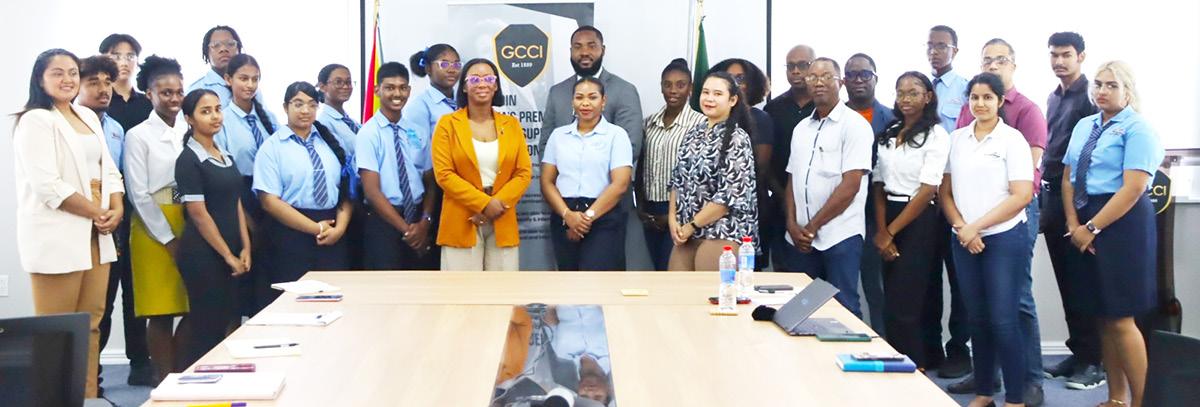
you do, show them that you are genuine in what you are teaching them,” Smith added.
Addressing the interns at the launch, Chairperson of the GCCI’s Entrepreneurship and Small Business Committee, Orson Ferguson, described the programme as an immersive experience designed to help shape the next generation of business leaders.
“The ‘Teenternship’ Programme is not just any internship, it is a chance for
you, our bright young minds, to step into the world of business, to learn, to contribute, and to be inspired,” he told the students.
GCCI Secretary, Kristia Ramlagan-Prescott, also urged the students to take full advantage of the experience. “I am happy that this is coming to fruition this year. I charge you to make memories and build relationships. Soak in everything that you learn, we are eager to hear your testimonials and suc-
cess stories in the next two weeks,” she said.
The ‘Teenternship’ marks the first of several events under National Small Business Week 2025, which will also feature seminars, workshops, and an exposition. The annual initiative is geared towards building the capacity of Micro, Small, and Medium-sized Enterprises (MSMEs), improving operations, and helping businesses adapt to Guyana’s evolving market needs.
This year’s NSBW is sponsored by Brava Business Solutions, Century Tamara Logistics Services Incorporated, Assuria Incorporated, the Society Against Sexual Orientation Discrimination, KOJAC, Dynotech Construction Chemicals Incorporated, ACE Consulting Group, Vista Services Incorporated, Green State Oil and Gas Services Incorporated, Lodestar Incorporated, and Fine Arts GY.
IN a significant gesture reflecting its commitment to regional integration and the Caribbean Community, President of Guyana, Dr. Mohamed Irfaan Ali, handed over the new official residence of the CARICOM Secretary-General to the incumbent officeholder, Dr Carla Barnett, at a ceremony in Sparendaam, East Coast Demerara, on Saturday.
Participating in the handover were Foreign Secretary, Robert Persaud; Permanent Secretary in the Ministry of Foreign Affairs and International Cooperation, Ambassador Elisabeth Harper; Guyana’s Ambassador to CARICOM, H.E. George Talbot; Permanent Secretary in the Ministry of Housing and Water, Bishram Kuppen and other government officials. Officials of the CARICOM Secretariat were also in attendance.
According to President Ali, “Guyana is steadfast in its support of regional integration…we are proud of the work of the Caribbean Community.”
This new, modern residence “not only meets the standards expected of such a facility, but it also eases the commute and supports the effective functioning of the office of the Secretary-General…[the residence] would also bring the Secretary-General closer to the seat of the Secretariat itself”, the President said.
Directing his remarks to the Secretary-General, President Ali thanked her for her continued service. “I wish you every success as you carry out your duties from your new residence. May the residence we hand over today, serve not only as a place or rest, but as a quiet symbol of our shared journey and of the future we are building together.”
The CARICOM Secretary-General, graciously receiving the keys to the official
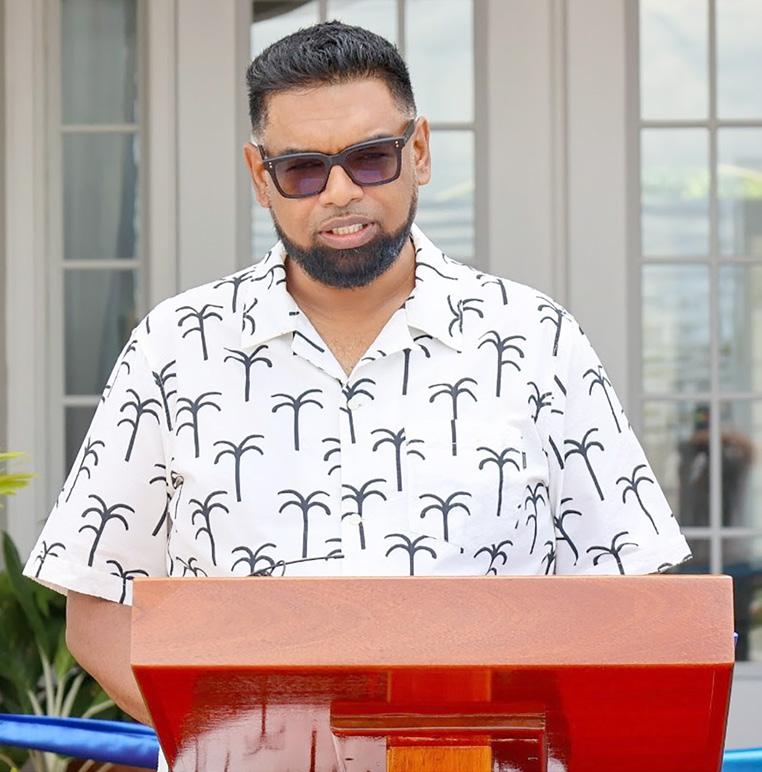
residence, expressed her appreciation to the Government of Guyana. She said, “I am happy that this part of the commitment of the Government of Guyana has come to fruition. It really is a pleasant place to live and my family and I look forward to living here. I know my successors will enjoy living here also.” Dr Barnett also excitedly informed those in attendance that flowers and fruit trees will be planted on the property to “represent each of the countries of the Caribbean Community.” Following the remarks, the CARICOM Flag was hoisted for the first time at the residence and President Ali signed the visitor’s book to mark the occasion.
Colgrain House in Georgetown, purchased by the Government of Guyana in 1975, accommodated the first six CARICOM secretaries-general, with the incumbent Dr. Barnett and her predecessor Ambassador La Rocque, accommodated in rental properties until the completion of the construction of the new residence.
(CARICOM press release)
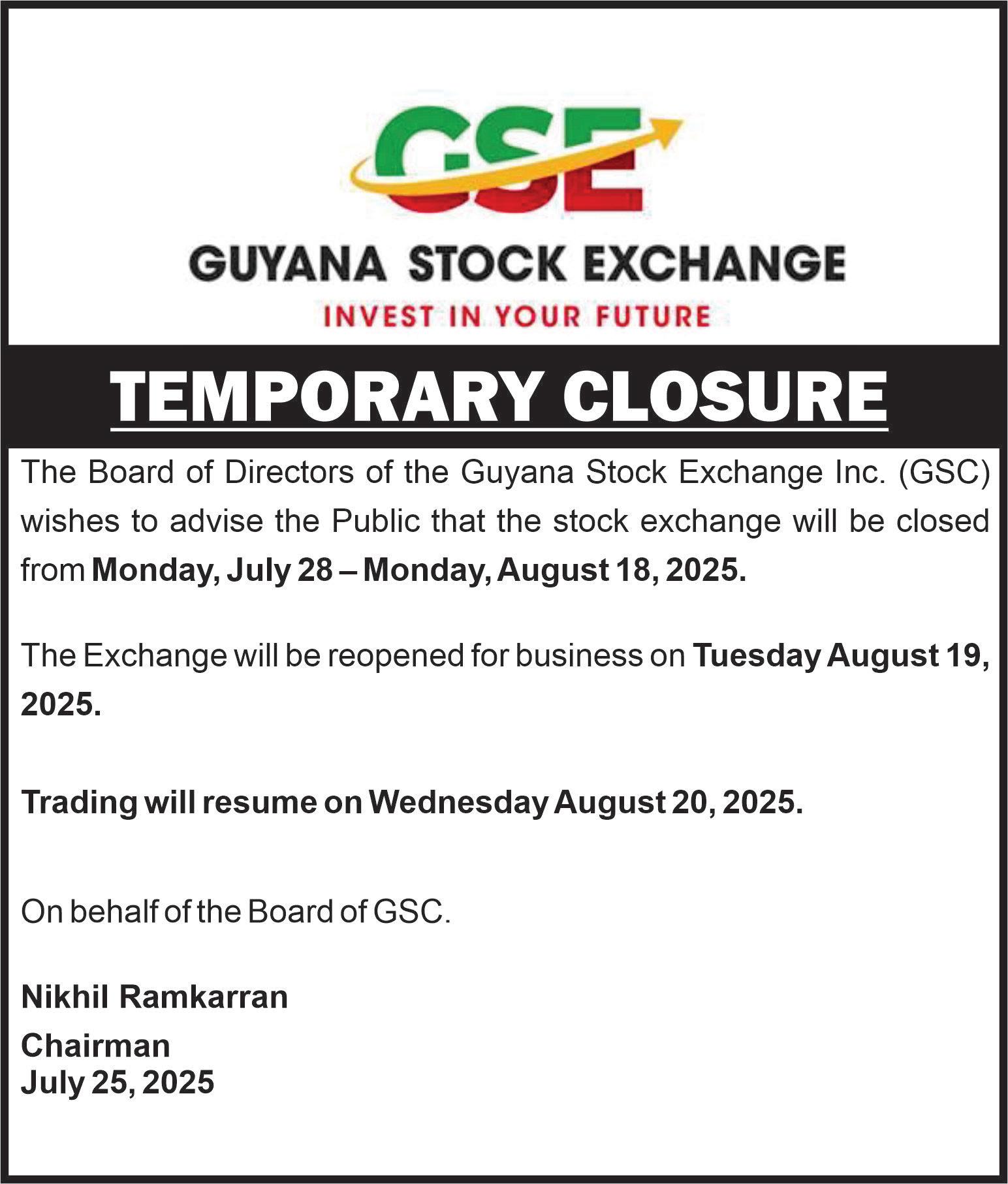
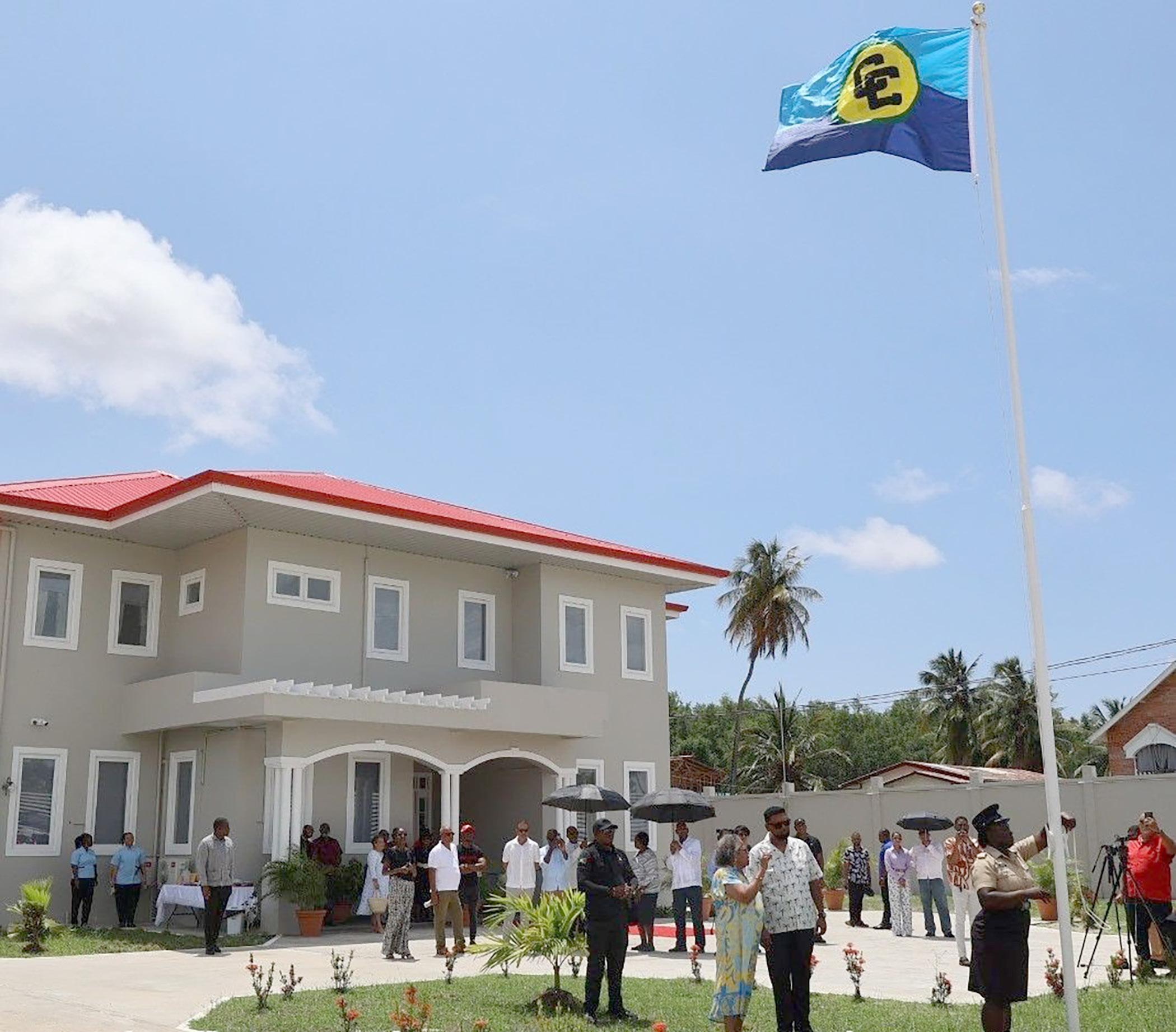

THE Guyanese economy recorded positive growth during the first quarter of 2025 as major economic transformation progressed in key sectors.
This was outlined in the Bank of Guyana’s report for that period. The financial institution, which monitors the economic well-being of the nation, was keen to note that the oil and gas subsector was a major contributor to growth, albeit moderately.
Expounding on the performance of the oil sector, the Central Bank said it recorded an increase of 1.8 per cent to 56.8 million barrels, a modest increase when compared to the 56 million barrels produced at the end of March 2024. This outcome, it said is primarily on account of strong contribution from Prosperity, Guyana’s third floating, production, storage and offload-

ing (FPSO) vessel, which experienced an 11.5 per cent increase in production of crude oil when compared to one year earlier.
The Central Bank noted that the Liza Destiny and Liza Unity FPSOs experienced lower production of
crude oil by 8.5 per cent and 0.1 per cent, respectively.
As it relates to bauxite production, the Central Bank said this grew significantly to 941,200 tonnes, compared to 96,638 tonnes one year earlier. This outcome, it said, is primarily on account of

(RASC) increased to 41,623 tonnes. It was noted, however, that the production of tailings bauxite declined to 13,951 tonnes.
Another strong performer in the extractives sector was gold. The Central Bank reported that declarations grew by 12.8 per cent to 101,369.2 troy ounces. The small and medium-scale miners also recorded higher declarations by 13.1 per cent, while the sole large-scale operator, Zijin, recorded an increase in declarations by 12.3 per cent.
higher production of Metallurgical Grade Bauxite (MAZ) of 804,179 tonnes.
In terms of Chemical Grade Bauxite (CGB), the Bank of Guyana said this increased to 81,447 tonnes, and Refractory Aggregate Super Calcined Grade Bauxite
The declaration of crushed stone also saw an increase to 1,432,332 tonnes, while production of manganese increased to 82,692 tonnes. In contrast, sand extraction declined by 3.7 per cent to 2,711,314 tonnes and diamond declarations declined by 58.0 per cent to 5,615.5 metric carats.
Overall, Central Bank
said, “The Guyanese economy is projected to record real GDP [Gross Domestic Product] growth of 10.6 per cent, as the oil and gas and support services sector is expected to grow moderately.”
Notably, this 10.6 per cent growth will keep Guyana on track to record the highest growth rate in the region.
As for non-oil GDP growth, the financial institution said it is projected at 13.8 per cent.
“This growth will be primarily due to continued development of the agriculture, forestry, and fishing sectors, along with further expansion of the construction, manufacturing and services sectors,” the bank said in its report. It was also noted that the gold and bauxite mining industries are expected to further expand and influence the growth of the nonoil economy.



AMERINDIAN communities across Guyana are being positioned to benefit from another wave of development initiatives as the government has already outlined plans to expand connectivity, reduce transportation costs and bolster economic activities in the hinterland during its new term in office.
The ruling People’s Progressive Party/Civic (PPP/C)



government has summarised its 2025-2030 manifesto, and it entails several plans that will deepen national development.
The manifesto brief points to continued land titling and demarcation, ongoing access to LCDS funding for sustainable development, increasing support for village development plans, introducing more ICT hubs in remote communities, investing in transportation and connectivity, and supporting local economic initiatives and community-based enterprise and job creation.
The brief layout was discussed, on Thursday, by PPP General Secretary and Guyana’s Vice President Dr. Bharrat Jagdeo, who explained that it was basically a summary of what is to be expected in the administration’s new term, building on its continued performance and not hollow promises.
During a press conference, he reminded Guyanese of the nation’s neglected state that the PPP/C met after assuming office in 2020. Even with battling COVID-19, the Vice President noted that throughout the length and breadth of the country, citizens have witnessed a positive shift in Guyana becoming a regional and global leader whilst simultaneously empowering the people.
While the APNU+AFC coalition had increased Value-Added Tax on hinterland travel, the PPP/C government removed it. The move has been pegged as a necessary corrective to APNU+AFC’s callous policies and just one step in the PPP/C’s wider plan to reduce the cost of living burdens and enhance economic activities within Amerindian communities.
The government is planning to place more focus on infrastructure upgrades that will connect more communities. The Vice President
said: “If we can continue to connect Region Eight- which we plan to do- to Region Nine by road... Then we don't have to fly all of the goods that they use into that region. And that's part of the plan connecting the two regions. So, that is one of the long-term plans; it may be in the next five years, we'll work on that.”
Similar plans are in place for Region One (Barima-Waini) following the completion of the Kwebana to Maruka Road and the Wauna to Mabaruma, and then Port Kaituma to Matthew’s Ridge. These plans will allow for the smoother transportation of goods and lower freight rates. Recognising persistent logistical challenges, the government is also considering having a commercial arm of the Guyana Defence Force (GDF), which could vastly improve access and affordability.
The Vice President said, “If that (freight rates) can't be reduced, then there will be a commercial arm to the GDF. And we will buy more aircraft, we said it here; the President repeated it in Mahdia. We will buy more aircraft to populate that commercial arm of the GDF that would assist with reducing the cost in the hinterland.”
This points to concrete plans by the government to continue expansion of economic growth, and according to Dr. Jagdeo: “Those are very specific plans we have. No other political party has been able to outline [theirs].” Travel to Guyana’s hinterland has become easier and more reliable following a major government drive to improve infrastructure. A series of new roads, bridges and airstrips have been built to international standards, transforming journeys that were once long and difficult. River transport has also been upgraded.
By Feona Morrison
GUYANA featured prominently in the Caribbean Court of Justice (CCJ) Annual Report for 2023/2024, which was released on Friday last. The report recorded a four per cent increase in new matters filed compared to the previous year, with Guyana contributing six of the 26 appellate cases. This placed it on par with Belize and just behind Barbados, which filed nine cases.
Dominica and Saint Lucia filed one and four cases, respectively. The cases were evenly split between criminal and civil matters. Among them was a high-profile appeal from Guyana that saw the regional court hearing novel matters in its Appellate Jurisdiction.
In Ramon Gaskin v Minister of Natural Resources and Others [2024] CCJ 14 (AJ) GY, the CCJ addressed environmental regulation in the oil and gas sector under Guyana’s Petroleum Act.
The case, which originated from the Court of Appeal of Guyana, marked the CCJ’s first detailed interpretation of the Act as it relates to environmental oversight. Gaskin challenged the issuance of a Petroleum Production Licence (PPL) granted to ExxonMobil Guyana Limited, CNOOC Petroleum Guyana Limited and Hess Guyana Exploration Limited.
He argued that each of the companies involved in the Stabroek Block joint venture should have acquired separate environmental permits prior to receiving the PPL. The High Court of Guyana had dismissed the claim after a delay of 366 days in delivering its judgment.
The Court of Appeal upheld the decision of the High Court, stating that the environmental permit was tied to the Liza 1 Project and that Exxon, as the operator, could comply with the environmental obligations.
The CCJ, in a judgement delivered by Justice Winston Anderson, who now serves as President of the Court, upheld the rulings of the lower courts. The Court held that the granting of environmental authorisation was a condition precedent to the granting of a PPL. Environmental authorisation must be

given for the undertaking of a project and the Environmental Protection Agency must be convinced that a developer can fulfil their role and responsibilities and comply with the terms and conditions of the environmental permit.
As the sole operator, ExxonMobil alone was able to comply with the obligations of the developer and was subject to extensive environmental obligations, which were extended to Hess and CNOOC through joint and several liability.
The grant of the PPL to CNOOC and Hess did not render the licence invalid for four reasons (i) the Act’s requirements were satisfied with Exxon being granted the environmental permit; (ii) the grant was consistent with oil and gas industry practice as Exxon the sole operator operated as representative of the joint venture; (iii) there was joint and several liability between the Companies for environmental harm; and (iv) there was no increased risk of harm to the environment under either the precautionary principle or the avoidance principle by the inclusion of Hess and CNOOC in the PPL.
Justice Anderson concluded that there was no basis for finding that the Minister of Natural Resources acted unlawfully.
The Annual Report also noted that the CCJ held a total of 45 sittings during the reporting period, which ran from August 1, 2023, to July 31, 2024. These included six case management conferences, 25 hearings, and 14 judgement deliveries. A large majority, 80 per cent, of these sittings were held virtually. Hybrid and in-person sessions accounted for seven per cent and 13 per cent, respectively.
The report showed that the CCJ’s Appellate Jurisdiction continued to be the more
immediate past president.
The CCJ was inaugurated in Port of Spain, Republic of Trinidad and Tobago April 16, 2005, and presently has a bench of six judges presided over by CCJ President, Justice Winston Anderson.
frequently used avenue. It received 26 new matters in the past year, up from 25 in 2022/2023. These included 11 applications for special leave and 15 appeals.
In contrast, the report emphasised that the court’s Original Jurisdiction remained underutilised. Only one new matter was filed during the reporting period, and it came from Trinidad and Tobago. Dominica, which had filed two matters in the previous year, did not file any in 2023/2024.
Approximately 58 per cent of the matters were disposed of within six months of filing. The vast majority of matters (approximately 97 per cent) were disposed of within one year of filing. Only one case fell outside of this period.
The clearance rate reflects a rate of 127 per cent for disposed matters against new matters. The first half of the Court year, August 2023 to January 2024, was the busiest with the highest numbers of new filings and disposals.
The clearance rate for disposed matters compared to new filings was 127 per cent. The majority of new filings and case disposals occurred in the first half of the Court year (August 2023 to January 2024). By the end of the Court year, only 10 cases remained pending, all of which had been filed less than one year earlier
Released under the theme "Advancing Access to Justice… Refining and Innovating for Impact," the report underscored the CCJ’s commitment to innovation, access, and responsiveness.
“The CCJ will not be deterred from advancing access to justice in the region. Never will our determination to continually refine our processes and to embrace cutting-edge innovations ever be blunted,” said Justice Adrian Saunders, the CCJ’s
The CCJ has an Original and an Appellate Jurisdiction and is effectively, therefore, two courts in one. In its Original Jurisdiction, it is an international court with exclusive jurisdiction to interpret and apply the rules set out in the Revised Treaty of Chaguaramas (RTC) and to decide disputes arising
under it.
The RTC established the Caribbean Community (CARICOM) and the CARICOM Single Market and Economy (CSME).
In its Original Jurisdiction, the CCJ is critical to the CSME, and all 12 Member States which belong to the CSME (including their citizens, businesses, and governments) can access the Court's Original Jurisdiction to protect their rights under the RTC.
In its Appellate Jurisdiction, the CCJ is the final court of appeal for criminal
and civil matters for those countries in the Caribbean that have altered their national Constitutions to enable the CCJ to perform that role.
At present, five states access the Court in its Appellate Jurisdiction, these being Barbados, Belize, Dominica, Guyana, and Saint Lucia.
However, by signing and ratifying the agreement establishing the CCJ, Member States of the Caribbean Community have demonstrated a commitment to making the CCJ their final court of appeal.
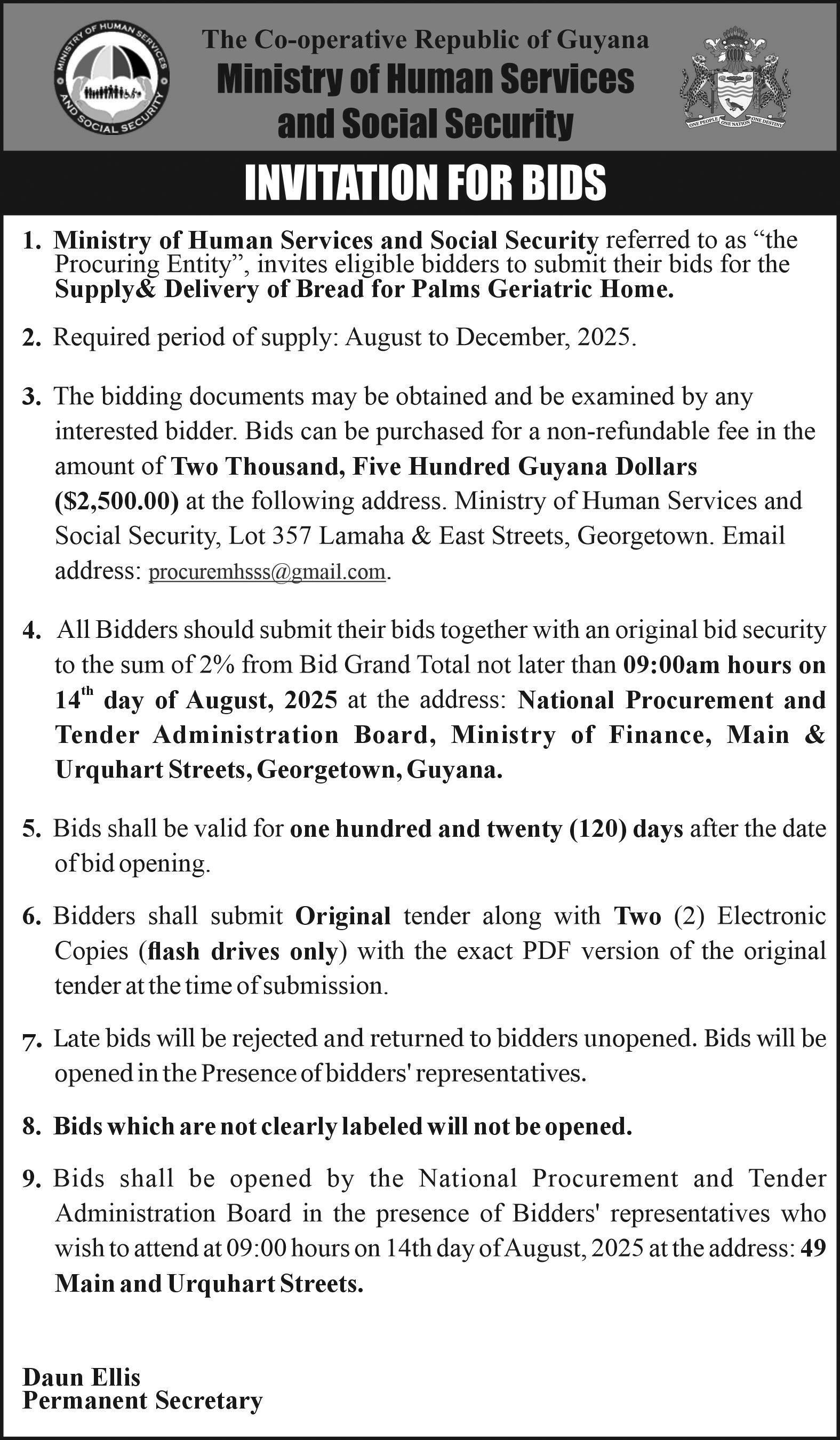
AS Guyana’s economy continues to grow, the government remains committed to uplifting families by integrating 100,000 women into the workforce. This initiative will not only create thriving futures for thousands of households but also boost the country’s Gross Domestic Product (GDP) and increase household spending power.
Statistics this year indicated that over 15,283 part-time workers are employed under its National Pathway Workers Project, which was implemented by the Office of the Vice President in 2022. This also complements the government’s impressive achievement of restoring and creating in excess of 60,000 jobs since entering office in 2020. This included the creation of part-time jobs which served as an impetus for com -
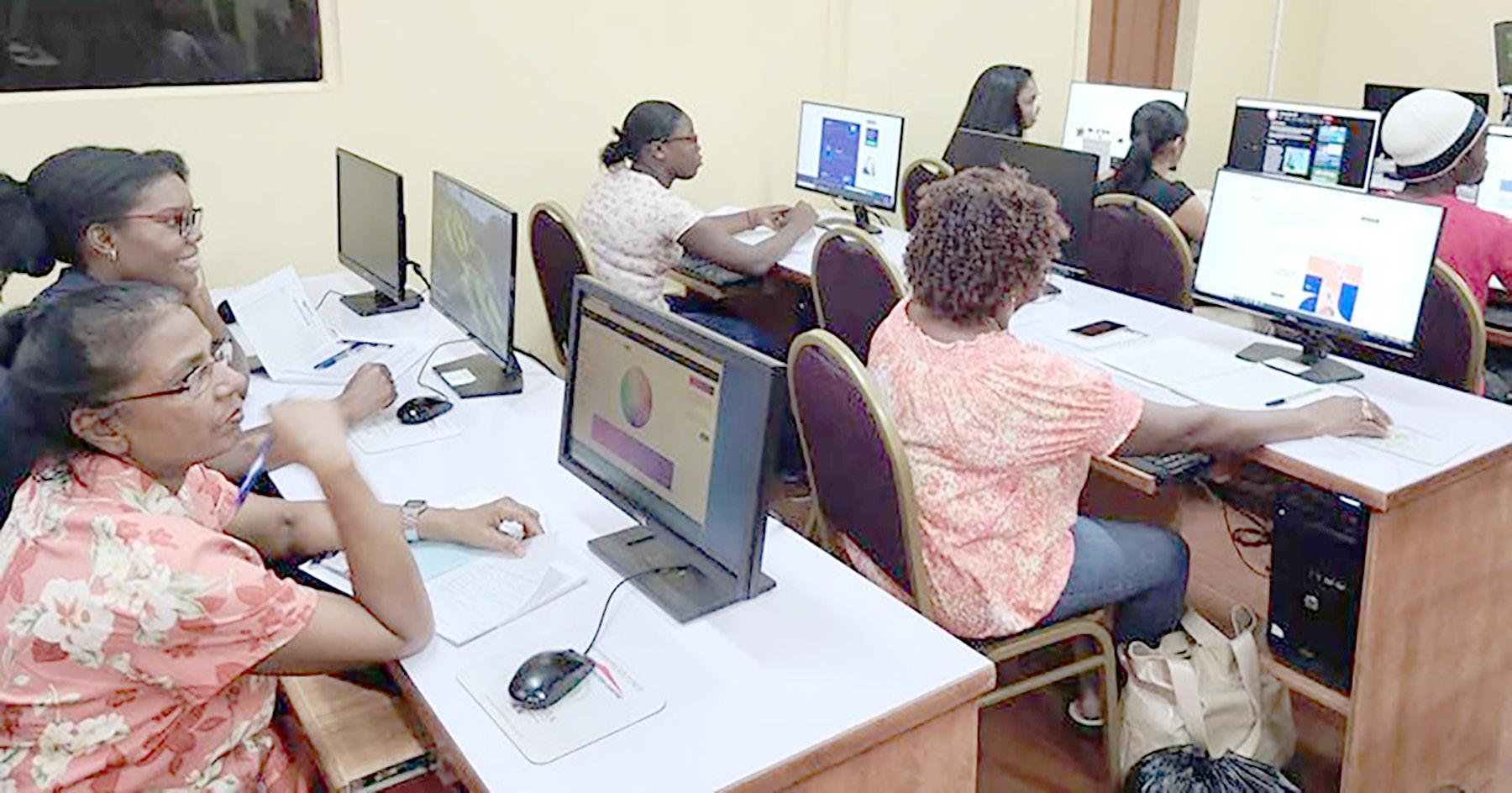
munity growth, where many persons started small businesses, and invested in agriculture, among other things.
From 2015-2020, thousands of Guyanese were placed on the breadline under the A Partnership for National Unity+ Alliance For Change (APNU+AFC) administration.
People’s Progressive Party (PPP) General Secretary and Guyana’s Vice President Dr. Bharrat Jagdeo on Thursday last, during a news conference,
told reporters about the government’s plan to boost local employment and manage the labour shortage.
“We want to get more women in the labour force. And so, we started with a part-time job, but we believe we can bring nearly 100,000 of our own people, our women, into the workforce. Because then we have more Guyanese working.”
He added, “We want our people to work. We want more people to
have more jobs, not because things are bad, but because they can move faster up in life. That is what we're doing. So first of all, taking care of our own people.”
Additionally, the billions of dollars invested under the current administration to fund initiatives like expanding educational and skill-building programmes, and increasing women’s workforce participation have positively impacted the lives of thousands of
women.
Entrepreneurial and skills training have been provided to over 23,700 women since August 2020 through the Women Innovation and Investment Network (WIIN) and Board of Industrial Training (BIT). Of this total, over 5,900 women were trained in 2024, and this year, the government is aiming for another 11,200 women.
Additionally, over 21,400 women were awarded Guyana Online Learning Academy (GOAL) Scholarships. This represents 72 per cent of total awardees since the commencement of this programme in 2021. Of this total, over 6,000 women were awarded a scholarship in 2024, and a further 6,750 are expected to be awarded in 2025.
Within five years of the PPP/C’s governance, the public sector workers are earning $105 billion more per
year in wages and salaries. This year, public servants enjoyed an additional eight per cent salary increase.
There has also been the strengthening of collective bargaining, including multi-year agreements signed with the government and, the Guyana Public Service Union (GPSU), the Guyana Teachers’ Union, and the Guyana Agricultural and General Workers Union (GAWU).
Significant tax relief measures have been implemented, including a $50,000 monthly tax-free allowance on overtime; an additional $50,000 exemption for income earned from a second job; tax thresholds were raised, with allowances for dependents, and restoration of the Joint Services’ one-month tax-free bonus, at a cost of nearly $2 billion.

ELECTRIC car owners can now rest assured that, if damaged, their vehicles will receive the care they need, as Guyana welcomes more electric vehicles than ever before. With EVs continuing to emerge on Guyana’s roadways, the Guyana Energy Agency (GEA) announced, in a statement on Saturday, that 27 auto electricians and mechanical technicians recently completed the fourth Electric Vehicle (EV) Maintenance and Repairs training programme.
The programme, which was held from July 14 to July 25, 2025, at the Mahaicony Technical and Vocational Training Centre (MTVTC), saw participants trained in high- and low-voltage systems, routine maintenance procedures, and the repair and replacement of EV components. Upon successful completion of the training, participants will be awarded an internationally recognised certificate from the Institute of the Motor Industry (IMI).
Supported by the European Union (EU), the training forms part of the EU’s Global Gateway strategy, which prioritises investments in renewable energy in Latin America and the Caribbean.
This activity in Guyana was facilitated under the Euroclima Programme, the EU’s flagship initiative to promote sustainable development and climate action. Other stakeholders in the programme include the German Federal Ministry for Economic Cooperation and Development (BMZ), which co-funded and supported the venture, as well as the Deutsche Gesellschaft für Internationale Zusammenarbeit (GIZ) GmbH, the implementing agency assigned to support this action in Guyana.
According to recent re-

(From left to right) Mr. Steve Burr, Senior Trainer and Director, REVAMP Training Limited; Dr. Alfred King, Permanent Secretary, Office of the Prime Minister; Dr. Ritesh Tularam, Deputy Chief Education Officer (Technical) Ministry of Education; Ms. Shevon Wood, Deputy Chief Executive Officer, Guyana Energy Agency; Mr. Collis Best, Administrator, Mahaicony Technical and Vocational Education Training Centre along with participants who completed the fourth EV Maintenance and Repairs Training Programme
ports, there are now over 200 electric vehicles on Guyana’s roadways, supported by six (6) publicly accessible EV charging stations located in Regions 3, 4, and 6. In a bold move to further encourage EV adoption, the government has introduced a range of fiscal incentives, including the removal of all taxes on EVs and the increase of the depreciation allowance for electric motor vehicles to 50%.
These measures are complemented by planned investments in seventeen (17) additional public EV charging stations across multiple administrative regions in 2025, highlighting that while still new, EVs are slated to quickly become a major part of Guyana’s vehicular landscape.
At the closing ceremony, officials highlighted both the symbolic and practical value of the training and the country’s investment in future-ready skills. Permanent Secretary in the Office of the Prime Minister, Dr. Alfred King, underscored that the training programme also demonstrates Guyana’s
commitment to clean energy, advancing technology, and building the capacity necessary for national development.
By equipping participants with the skills needed to support the EV industry, the initiative not only builds public confidence in this emerging mode of transportation but also accelerates the country’s swift transition to electric mobility.
Moreover, Dr. King further encouraged the participants to explore the entrepreneurial opportunities made possible by their newly acquired expertise, highlighting that they now stand as an integral part of an emerging industry.
“Electric mobility is no longer a concept of the future; it is happening now. You have acquired specialised skills that are in high demand, and you now stand at the forefront of one of the most exciting transitions in our energy and transport sectors. Your training is not only a personal achievement, but also a national asset,” said the Permanent Secretary.
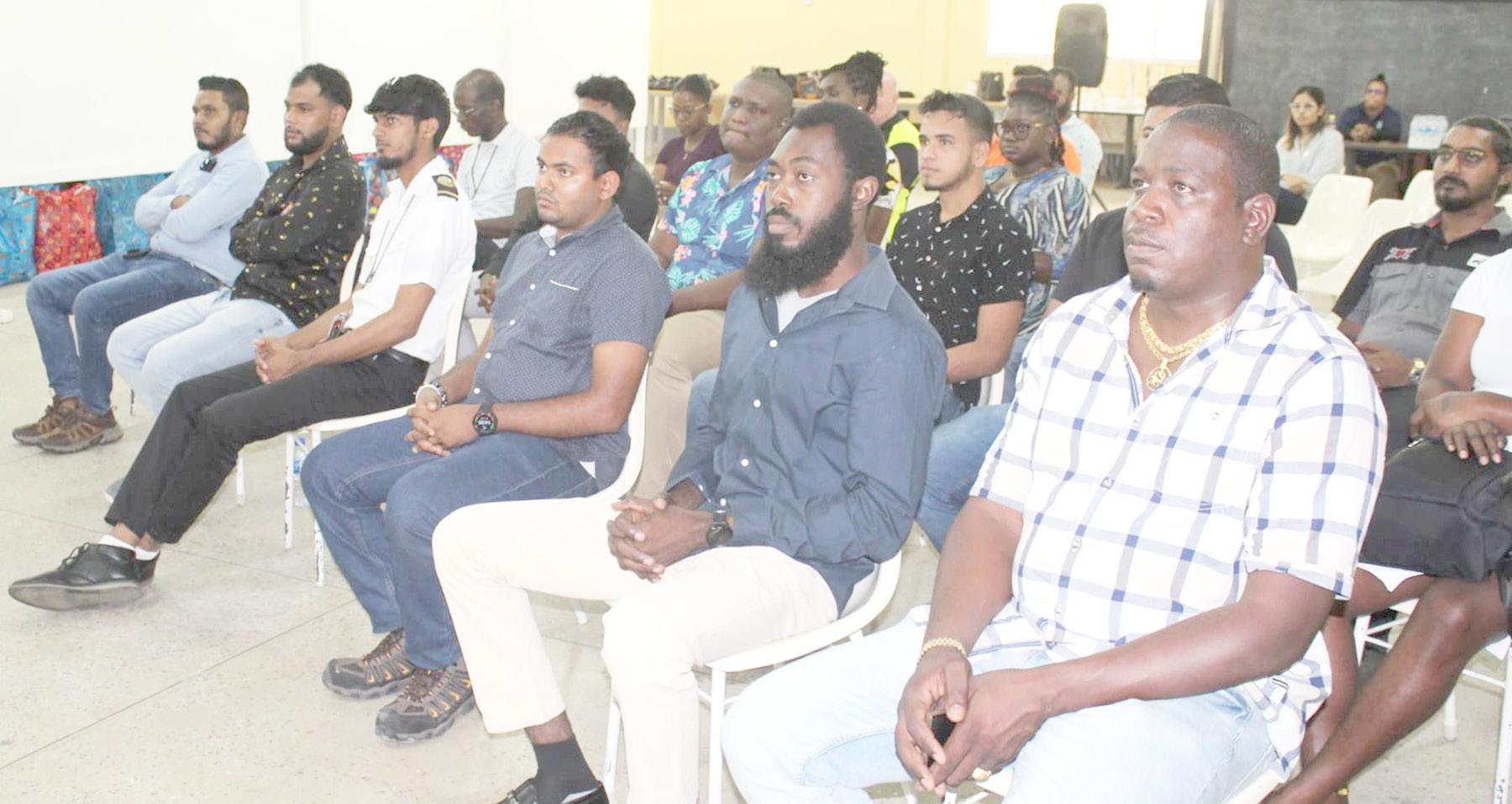
Education, spoke directly to the participants, commending them for their commitment to upskilling in how to identify, repair, and maintain electric vehicles and their various components.
He encouraged them to view this achievement as a step forward in showcasing the tangible benefits of skills development within Guyana’s evolving electric mobility landscape. He noted that the skills acquired will support both the upkeep and servicing of EV technologies in Guyana and play a pivotal role in driving the country’s national objectives for electric transportation and the transition to a more sustainable economy.
With this most recent cohort, a total of 77 auto electricians and mechanical technicians have now been trained to repair and maintain electric vehicles. The current cohort was divided into two groups which underwent classroom theory training as well as hands-on practical training to develop essential skills in maintaining and repairing hybrid and electric vehicles (EVs).
Dr. Ritesh Tularam, Deputy Chief Education Officer (Technical) at the Ministry of
From a policy perspective, the GEA emphasised its continued commitment to developing and implementing sustainable energy initiatives.
Deputy Chief Executive Officer of the GEA, Ms. Shevon Wood, highlighted that the agency, under the mandate of the Government of Guyana, remains committed to implementing sustainable energy development initiatives, particularly to ensure access to affordable, reliable, stable, and modern energy. She stated that the Agency will continue to invest in the
initiatives that enhance local technical capacity. Additionally, she shared that the Agency will continue efforts to raise public awareness of low-carbon transportation, promote electric vehicle adoption, and support the development and management of infrastructure essential for the widespread integration of EVs slated to happen on Guyana’s roadways. These efforts are vital in ensuring the effective transfer of technical expertise as well as the long-term sustainability of the electric mobility sector. The initiative aligns with the Government of Guyana’s broader national goal of expanding Technical and Vocational Education and Training (TVET) opportunities by equipping the local workforce to meet the demands of the growing electric mobility sector.
In keeping with the objectives of the Low Carbon Development Strategy (LCDS) 2030, the initiative also forms a key part of the strategy that aims to continue transforming how energy is produced and used in Guyana, as well as how transportation systems operate across the country, ensuring sustainability remains a priority.




83 Garnett Street, Georgetown (Tel: 225-6158)
Answers to yesterday’s quiz: (1) Gudakesh Motie-2/29 (2)
Today’s Quiz: (1) Who top-scored for the WI in the second T20 game of the current series against AUST? (2) What was the highest score made by an AUST in that match?
issue.
TADEJ Pogacar is set to secure his fourth Tour de France title after maintaining his overall lead, as Kaden Groves won the penultimate stage of this year’s race.
Australian sprinter Groves claimed his first Tour stage win in Pontarlier after launching a solo attack with 16km remaining.
Pogacar completed the 184.2km hilly stage safely in the peloton meaning that, barring an accident, the 26-year-old Slovenian will seal his title defence on Sunday.
The final day of the Tour is a processional stage,


where traditionally the general classification leader is not challenged.
Groves has now completed the trilogy of claiming stage victories on each of the three Grand Tour races, having also won at the Vuelta a Espana and the Giro d’Italia.
Alpecin-Deceuninck handed the 26-year-old his Tour debut this year and he has become the third rider from the Belgian team to win a stage on the 112th edition of cycling’s biggest race.
Alpecin’s star riders Jasper Philipsen and Mathieu van der Poel triumphed on the first two stages, before later being forced to abandon the Tour through injury and illness respectively.
“There are so many emptions to win here,” said Groves. “The team, we came here with so many different plans with Jasper and Mathieu.
“In the end, I get my own opportunities and they haven’t gone the right way. But today I had super legs. I just suffered to the line and, as a reward, we get a Tour stage.
The 160 remaining riders had to contend with rain soon after the start in Nantua and intermittently along the route.
Groves was then part of a 13-man breakaway that was formed after the second of the day’s four categorised climbs.
His compatriot Harry Sweeny attacked over the
day’s penultimate climb and went clear of Jordan Jegat with 54km to go, but the EF Education-EasyPost rider was caught on the first slopes of the final ascent.
Local favourite Romain Gregoire and Spanish debutant Ivan Romeo attacked on the downhill but as they sped into a wet turn, both slipped to the tarmac, with 21-yearold Romeo coming off worse as he also slid into the kerb.
Groves was right behind them so watched it all unfold and sensed his opportunity, attacking with 16km remaining.
Frank van den Broek and British rider Jake Stewart merely looked at each other, with that momentary stalemate allowing Groves to go clear.
He gradually increased his lead to the line, where he was sobbing after clinching an emotional victory.
“The team gave me a free role in the last few days,” Groves added. “We weren’t sure if I should go for it today or wait until tomorrow. But when the rain falls, I always have a super feeling normally, in the cold weather. It’s my first time winning solo - and it’s in a Tour stage, [so] pretty incredible.
“There’s so much pressure at the Tour. Having won in the Vuelta and the Giro, I always get asked whether I’m good enough to win in the Tour - and now I’ve shown them. (BBC Sport)
Matt Henry defended six runs off the final over as New Zealand clinched the Harare tri-series trophy, beating South Africa by three runs in a tense finale. It marked the only successful defence of a total in the tournament, as New Zealand maintained a 100 percent win record.
Chasing 181, South Africa looked in control at 92 without loss in the tenth over. But the tide turned when they lost 4 for 39, leaving them needing 50 off the last 29 balls. Dewald Brevis and George Linde brought them close with a 43-run stand off 25 balls, but both perished in the final over as pressure mounted.
• Scores: New Zealand 180 for 5 (Ravindra 47, Conway 47, Ngidi 2-24) beat South Africa 177 for 6 (Pretorius 51, Hendricks 37, Henry 2-19) by three runs.
Brevis, on 31 off 14, couldn’t connect with Henry’s first ball. He tried to muscle the second, a short one, but found Michael Bracewell at deep midwicket. Corbin Bosch managed two runs off his first ball after a misfield by Bracewell, then put Linde back on strike. Linde drove to long-on, where Daryl Mitchell took a low catch. That left Senruan Muthusamy needing four off the final delivery. Henry took the pace off; Muthusamy swung early and missed. New Zealand held firm.
Henry, who ended as the tournament’s top wicket-taker with ten in four matches, led a disciplined bowling attack. After dominating the earlier games, this final tested New Zealand’s resolve.
New Zealand’s innings was built on a 75-run opening stand between Tim Seifert and Devon Conway. But despite being 68 without loss in the eighth over, their momentum slowed. South Africa pulled them back, allowing just three boundaries in the final three overs, with New Zealand finishing on 180 for 5.
Seifert was aggressive early, scor-
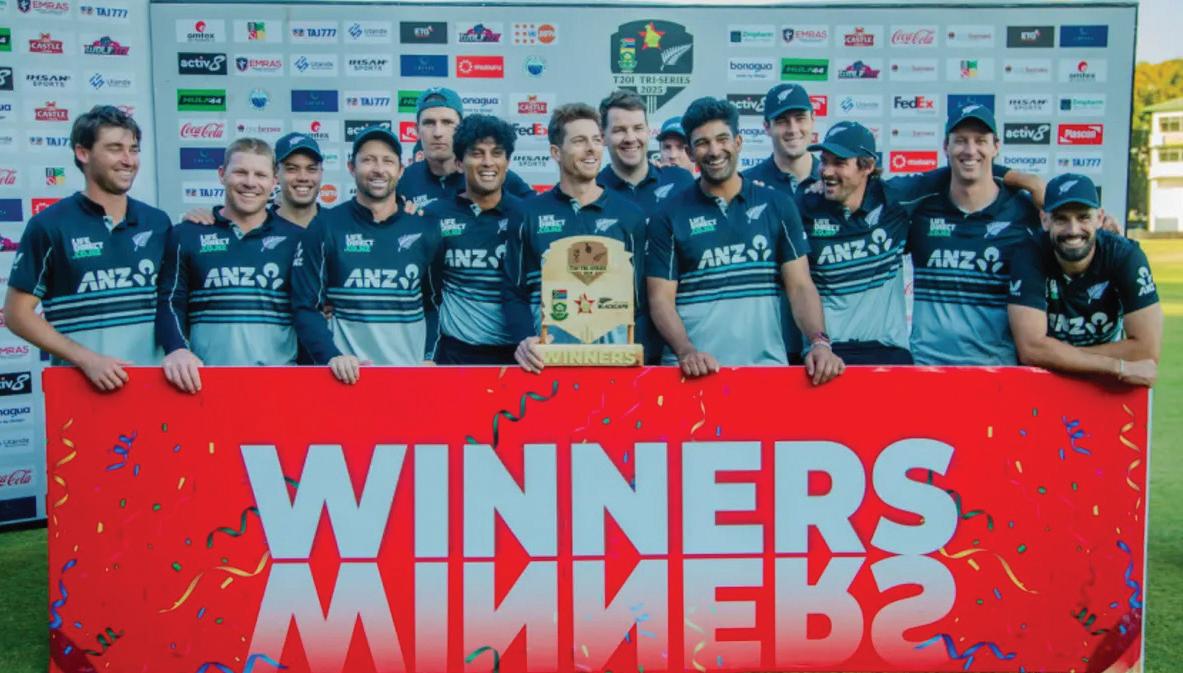
ing 30 off 27 before falling to Senruan Muthusamy, slicing to extra cover where Rassie van der Dussen took a sharp catch. Conway followed for 47, and Mark Chapman holed out for 3. Michael Bracewell was dismissed in the final over by a low, sharp catch from Linde.
Rachin Ravindra stood out again with a stylish 47 off 27, scoring 38 of those runs on the leg side. He punished anything on his pads and dismantled Muthusamy with a six over long-on and another over deep square. Ravindra threatened to take the game away entirely but fell short of a half-century, toe-ending Nandre Burger to Brevis.
While Seifert and Conway were consistent throughout the series, Ravindra’s shot selection and wrist work made him a standout in the final.
South Africa’s bowlers, led by Lungi Ngidi (2 for 24), had their moments. However, 13 wides — including eight from the seamers — highlighted their discipline issues.
Lhuan-dre Pretorius, reinstated as opener, made a statement with 51 off 33. He was tested early by Henry, Jacob Duffy, and Zakary Foulkes, but grew in confidence. His opening partner Reeza Hendricks also started quickly, collect-
ing 18 of his first 20 runs in sixes.
Pretorius opened with a crisp drive past mid-on off Henry and later launched Mitchell Santner for a six over midwicket. He reached his fifty with a towering six off Bracewell, before being caught behind attempting another big hit.
Their 92-run opening stand put South Africa in a commanding position before the middle-order faltered.
Duffy, the ICC’s top-ranked T20I bowler, started with just 13 runs conceded from his first two overs. He later returned to remove Rubin Hermann, who failed to clear the long-on boundary. Duffy thought he had Brevis caught behind but was denied as the ball was called wide. He surprisingly didn’t bowl the 18th — which cost Zakary Foulkes 15 runs and swung the game briefly in South Africa’s favour.
Duffy’s final over went for 17 as Brevis hit two sixes, seemingly tilting the match towards South Africa. But Henry’s final over composure proved decisive.
South Africa’s inexperience showed under pressure, while New Zealand’s seasoned campaigners stepped up once again. (ESPN Cricinfo)
AIDEN Markram and Temba Bavuma return to lead South Africa on the upcoming white-ball tour of Australia in August.
While Bavuma has been out of action since the triumphant World Test Championship final at Lord’s in June with a hamstring injury, Markram was one of the few seniors afforded rest. They missed the two Tests in Zimbabwe while Markram sat out of the subsequent T20I tri-series there, also involving New Zealand.
“It’s great to have our senior players back in the mix after their rest following the WTC Final,” head coach Shukri Conrad said. “Their experience and quality add real value to the group as we continue to build a strong core in both formats. Every series from here on plays a part in shaping our squads for next year’s T20 World Cup and the 50-over World Cup at home in 2027.
“Touring Australia is never easy. We know their conditions and intensity will test us in every department, and that’s exactly the kind of challenge we’re after.”
• South Africa T20I squad: Aiden Markram (captain), Corbin Bosch, Dewald Brevis, Nandre Burger, George Linde, Kwena Maphaka, Senuran Muthusamy, Lungi Ngidi, Nqaba Peter, Lhuan-dre Pretorius, Kagiso Rabada, Ryan Rickelton, Tristan Stubbs, Prenelan Subrayen, Rassie van der Dussen.
• South Africa ODI squad: Temba Bavuma (captain), Corbin Bosch, Matthew Breetzke, Dewald Brevis, Nandre Burger, Tony de Zorzi, Aiden Markram, Senuran Muthusamy, Keshav Maharaj , Wiaan Mulder, Lungi Ngidi, Lhuan-dre Pretorius, Kagiso Rabada, Ryan Rickelton, Tristan Stubbs, Prenelan Subrayen.
South Africa have also given Prenelan Subrayen his maiden ODI and T20I call-up after he recently made his Test debut in Zimbabwe. The off-spinner comes in having led the Dolphins to the One-Day Cup title earlier in March. Lhuan-dre Pretorius has also been named for the first time in the ODI squad. The hard-hitting batter, who turned heads in the T20 circuit, made his Test and T20I debut in Zimbabwe over the last one month. Brevis, who also made his Test bow in Zimbabwe, has been included in both the squads. Besides these two, the likes of Markram, Ryan Rickelton, Tristan Stubbs, Corbin Bosch, Nandre Burger, Lungi Ngidi and Kagiso Rabada also feature in both the squads.
The tour will kick off with the T20Is on August 10, 12 and 16 followed by the three 50-over games on August 19, 22 and 24. (Cricbuzz)
Fresh off a win at the Diamond League in London with a leap of 8.20m, long jumper Wayne Pinnock has addressed public reaction to his decision to switch allegiance from Jamaica to Türkiye — and clarified his pointed remarks about not receiving congratulations after his Olympic silver medal in Paris.
Pinnock explained that his comment was directed specifically at the Jamaica Athletics Administrative Association (JAAA) and its president, Garth Gayle.
“It had nothing to do with the JOA or the Ministry,” Pinnock told Sportsmax. TV. “I never got any congratulations from the JAAA. I’ve seen nothing from the Minister either, but I don’t doubt she
sent one — I respect her a lot.”
Still, Pinnock made it clear that the lack of acknowledgement wasn’t the main reason for his switch.
“Jaydon [Hibbert] and I had a long talk. We’re both trying to secure our futures. This decision wasn’t just about medals — it’s about stability, even after retirement.”
Despite winning silver at the 2023 World Championships, the 2024 Olympics, and the 2025 World Indoors, Pinnock said Jamaica’s lack of support left him feeling vulnerable.
“I love my country, but if I get hurt tomorrow, I know I’ll have to pay out of pocket. Jamaica doesn’t have a system to support athletes when we’re done.”
The approach from Türkiye came in June through his coach, Travis Geopfert. After discussing it with his family, Pinnock accepted the offer — which includes financial support, logistical backing, and a post-career transition plan.
“They actually told me to go ahead and do it. It made sense.”
He said he plans to relocate with his family and will spend several months each year in Türkiye. Pinnock also shared that the Jamaica Olympic Association consistently showed him respect — something he says was missing from the JAAA.
“This wasn’t about malice. I still love Jamaica. But this was a life-changing opportunity, and as my coach said — if you get one, take it.” (Sportsmax)

By Sean Devers
WATCHED by small but vocal gathering in glorious sunshine, Joshua Bollers and Joshua Persaud spearheaded Malteenoes Warriors U-19 team to a 71-run win over the Precision Sports female team yesterday on a heavy MSC outfield.
This match was in preparation for the Precision Sports female T20 tournament against the Hibiscus female team of Trinidad and Tobago from August 9.
The five-match series and the Male exhibition match will be played at the Malteenoes ground.
According to Precision Sports, the Guyana Cricket Board (GCB) has officially approved the tournament which runs from August 9-16 and has given permission for the use of their LBI facility for preparation for this tournament.
The GCB has also approved the use of the National female players in this tournament.
On Saturday, the host batted first led by an entertaining 50 with three sixes and a four from 15-year-old Bollers before he retired out.
Julian Craig (12) and Wasim Ali (12) also got into double figures as Malteenoes reached 131-7 when their 20 overs expired.
National U-19 female pacer Crystal Durant had two

wickets while three run outs aided the lady’s cause.
The National U-19 pair of Naomi Barkoye and the left- handed Anastacia Valenzula staged a recovery with positive batting.
Left-arm pacer Keon Byass was very expensive with he was hit back over his head for six by Barkoye before Valenzula swept him for six and Barkoye clipped him for four.
Valenzula, a senior National selectee, was stupendously caught at deep squareleg by Shem Rampersaud to give off spinner Joshau Ramdat the first of his six scalps.
When Naomi Barkoye, who hit a six and a four in her top score of 20 and younger sibling Cianna fell to Ramdat, ladies collapsed from 53-3 to 60 all out in 14.1 overs. Ramdat ended with 6-11 including a hat-trick.
TIM David hit the fastest T20 International century by an Australian as they beat the West Indies to take an unassailable 3-0 lead in their five-match series.
The batter hit 11 sixes and six fours as he ended 102 not out off 37 deliveries, with Australia cruising to a six-wicket victory at Warner Park in Basseterre, Saint Kitts.
Josh Inglis held the previous record, with his century against Scotland in 2024 coming off 43 balls.
“I was just having a great time. I didn’t think I would get the opportunity to get a hundred for Australia so I’m stoked,” said David, who has previously played for Singapore and made his Australia debut in 2022.
“The pitch was good and small boundaries so you have to back your strengths. Warner Park is a great place to bat and it was great to have experience here in the CPL (Caribbean Premier League).
“I’ve spent a lot of time working on power hitting but now I’m working on my shot selection.”
Australia won the toss and put the West Indies into bat, but the hosts made a strong start. Shai Hope and Brandon King put together a 125-run opening stand in 11.4 overs, with captain Hope recording an unbeaten 102 off 57 balls.
The West Indies continued to score at more than 10 runs an over as they posted 214-4.
Australia’s reply initially stuttered as they found themselves 61-3 after 5.5 overs, but David’s century saw his team surge to
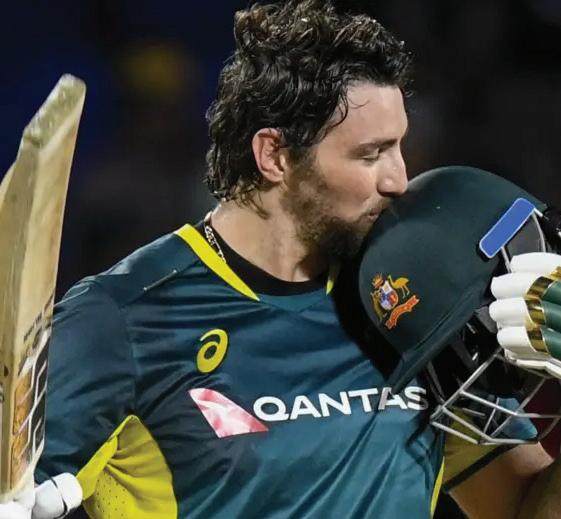
victory with 23 balls to spare.
“There are no words for that innings from David,” said Australia captain Mitchell Marsh.
It is the joint third fastest T20I century in a match between sides who are full members of the International Cricket Council.
David Millar bludgeoned a 35-ball century for South Africa against Bangladesh in 2017, a feat matched by Rohit Sharma for India against Sri Lanka later that year.
David’s effort matches that of Abhishek Sharma for India against England in February 2025. The fastest T20I is Sahil Chauhan’s 27-ball effort for Estonia against Cyprus in 2024.
Australia won the first T20 by three wickets and second by eight wickets. (BBC Sport)
A DOMINANT bowling display helped the West Indies Under-19 Women secure a five-wicket win over the USA Under-19 Women to take a 1-0 lead in their fivematch Youth T20I series at the Sir Frank Worrell Memorial Ground on Saturday.
The hosts, after winning the toss and choosing to bowl first, restricted the Americans to just 66-9 in their 20 overs.
Maahi Madhavan (15) and Aditi Kumar (10) were the only USA batters to reach double figures, compounding the dominance
from the West Indians with the ball.
Spinners Naijanni Cumberbatch and captain Samara Ramnath took 4-12 from four overs and 3-12 from four overs, respectively, while pacer Amrita Ramtahal took 2-18 from her four overs.
The West Indies then took 15.4 overs to reach 67-5. Cumberbatch completed an excellent all-round performance with a top score of 26 off 26 balls.
The second match is scheduled for today at the same venue. (Sportsmax)
• From Page 24
Gill looked troubled at the start. His front pad was a big target. Thirty-seven percent of his dismissals in Test cricket are lbw and bowled and England went really after him.
Jofra Archer produced an inswinging yorker that nearly took him out only for DRS to reveal that the ball hit both the inside edge of his pad and the outside of his front pad almost at the same time.
In the middle of this examination, Gill played a shot away from his body and immediately looked like he hated himself. Eventually, he looked up and realised it had raced away towards the cover boundary.
And from there, he just decided to trust his game and play his shots.
Not in the same way as throwing the bat around and hitting himself out of trouble, just backing himself to play to his strengths.
Out came the drives, and when Gill went down the ground, he evoked the history of that bat he was holding. A couple of guys with MRF sponsored equipment were good with that particular stroke.
He cut the ball well, gaining a little payback over Archer who had hit his hand which had been bandaged up. There were also several drop-and-runs to rotate strike and share the pressure with his partner.
It was a good innings, which could easily
have been cut short at 46 when Carse had him playing away from his body again only for Liam Dawson to drop a tough catch at gully.
Gill made the most of that generosity to continue his run-spree. He went past Virat Kohli’s 655 runs against England in 2016 and is chasing down Sunil Gavaskar’s record of most runs as an Indian captain in a Test series (732).
Crucially, he became confident of his defence too. From being 46 off 52 with eight fours, he went to stumps scoring a further 32 off 111 with two fours.
Rahul was old-school too, right from the start. He backed his technique even when the new ball drew plenty of life out of the pitch.
Archer when an absolute seed
past his outside edge.
Rahul’s judgment on what to play and what to leave was all the more impressive considering the time India were stuck in the field and how they were trailing the game. He was 20 off 71. Perfectly content, then bit by bit he accepted the rewards of his patience, scoring 67 off the next 139 balls and going past 500 runs in a series for the first time in his career. Rahul too had a little luck break his way when on 36, and an inside edge off Dawson skirted just wide of his leg stump. A day five with immense possibility awaits. (ESPN Cricinfo)
…Intends to broaden reach to train umpires in Central and South America
PRESIDENT of the West Indies Cricket Umpires Association, Vivian Johnson has said that the foremost major plan of the regional body is to increase training opportunities in the territories by planning and delivering training seminars, utilising the association’s chairman along with senior umpires, other certified trainers, plus the utilization of former ICC Elite Umpire Joel Wilson to be a part of this venture.
Johnson made the disclosure during his report at the recently-concluded 31st Biennial Convention of the WICUA, held at the Cascadia Hotel & Convention Centre in Trinidad & Tobago.
According to Johnson, “in speaking with persons in some of our territories, the need is great. We are going to prioritize them at the start of the programme, but we intend to reach all the territories.
“In addition, WICUA is the full member responsible for cricket umpiring in this hemisphere: We intend to significantly broaden our reach to train umpires in Central and South America and to invite some of these countries to become members of WICUA.
“We would like to utilize the services of Messrs. Wilson, Nero, and other senior umpires to be our ambassadors to reach into these areas to expand umpiring opportunities in this hemisphere. A part of the plan is to have the trainers officiating in matches with these umpires as part of the training exercise to bolster their confidence.”
Johnson pointed out that the WICUA is planning to work in tandem with the territories to procure much needed training equipment necessary to augment the training programnes. “These include computers, overhead projectors, screens, software and other necessary training equipment to ensure the programmes meet the technological requirements
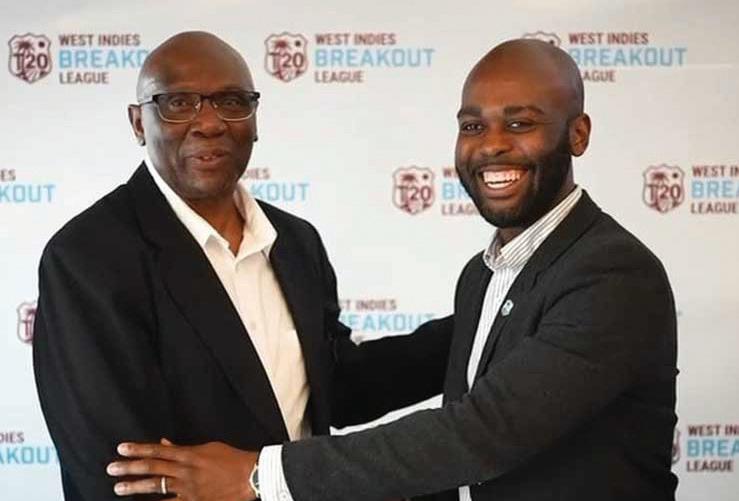
to successfully carry out the training programme.’
Acknowledging that the Memorandum Of Understanding (MOU) and the umpire’s contract will end in 2027, Johnson said the WICUA will be planning its preparation documents for 2026 to submit a comprehensive and detailed proposal to Cricket West Indies in January 2027 for the new contract period, and the renewal of the MOU, the aim is to get increased benefits from the package. The WICUA, Johnson said, is looking at increasing the funding for the Exchange Programme, as well as expanding the programme to include more umpires and will be working with the territories to make this happen.
The WICUA also intends to ensure that the WICUA website is accessible to all umpires and an outreach programme will be developed to promote and publicize the website to make it more informative, inciteful and provide
educational information.
According to Johnson, the WICUA is aiming to forge and establish a mutually beneficial relationship with ICC Americas to include Training, Exchange Programmes to widen the reach, influence and experience. Funding will be sought from ICC Americas to augment this programme.
“Our aims and objectives based on our Vision and Mission Statements are to make this association the envy of world umpiring organisations and to make our members and umpires fulfill their dreams and aspirations to become world class cricket umpires within this region, this hemisphere and the entire world, wherever they officiate.
We intend for them to showcase their mastery and their exceptionally well trained and developed experience to show to the world that the WICUA umpires are a force to be reckoned with,” Johnson boasted. (Frederick Halley)
‘Not something I will focus on’ – Joe Root on runs record
BATTER Joe Root says he will not focus on beating Sachin Tendulkar’s Test run-scoring record during the rest of his career.
Root, 34, moved up to second in the list with his century on day four of the fourth Test against India at Old Trafford on Friday.
He now has 13,409 Test runs - 2,512 adrift of India legend Tendulkar’s record.

“Those sort of things should look after themselves,” Root told BBC Test Match Special.
“The focus has to be about winning games, setting them up if we’re earlier on in the Test match and if we need to chase something down, figuring out how to play that situation well.
“It might sound a little bit boring and methodical, but ultimately that’s what I need to do to help England win and that’s why we play the game.”
Root surpassed Ponting with his 120th run in England’s first innings. Earlier in the knock he also pipped India great Rahul Dravid and legendary South Africa all-rounder Jacques Kallis.
He reached his current position in his 157th Test. Tendulkar played 200 Tests between 1989 and 2013 and played in Root’s debut in India in 2012.
“It’s not something that I will focus on,” Root said.
“Ricky’s someone that I grew up admiring, watching, trying to emulate, copy in the garden and at my local club - trying to play the pull shot that he’s obviously world famous for.
“So even just to be spoken about in the same sentence as those guys, the people that you grew up wanting to emulate and pretending to be is pretty cool.”
Across his career, Root is averaging 85.4 runs per match. At that rate, he would need 30 more Tests to pass Tendulkar.
But since the beginning of 2021 he has averaged 93 runs per Test and since the third Test in India last year, 101 runs in 19. That would mean he would reach Tendulkar’s haul in 25 Tests’ time, possibly in the summer of 2027 when he would be 36.
Root credited work during the Covid-19 pandemic and conversations with former England captain and TV pundit Nasser Hussain for his improvements.
“I actually spoke to Nass quite a bit,” Root told Sky Sports.
“I said, ‘can I get some footage?’ and just look at modes of dismissal and if there were any trends and seeing the different ways I was getting out at different points in my innings.”
WEST Indies Champions fell by 49 runs to Pakistan Champions in their World Championship of Legends clash on Saturday at Headingley in Leeds, England.
Pakistan, after winning the toss, posted 200-4 from their 20 overs thanks to an excellent century from Kamran Akmal.
Akmal hit 113 off just 62 balls, hitting 13 fours and five sixes to lead the
Pakistani batting effort.
Captain Mohammad Hafeez supported well with 23 while Akmal’s opening partner, Sharjeel Khan, made 21.
Dwayne Bravo, Kieron Pollard, Ashley Nurse and Dave Mohammed were the wicket-takers for the West Indies.
The West Indies were then restricted to 151-7 from their 20 overs in reply.
Chadwick Walton led the scoring with 42 while William Perkins (30),
Dwayne Bravo (30*) and Ashley Nurse (25) also had decent contributions after the top three of Dwayne Smith (3), skipper Chris Gayle (5) and Lendl Simmons (0) all failed to contribute.
Rumman Raees was the pick of the Pakistani bowlers with 3-4 from his three overs while Aamer Yamin and Sohail Tanvir took 2-23 from three overs and 2-24 from four overs, respectively. (Sportsmax)


Music echoed around Old Trafford this morning. The trumpeter had chosen well. The things Ben Stokes was doing out there was beyond the realms of normal men. So he or she picked up their instrument, put it against their lips and belted out the Superman theme. Paaaa-pa-pa-pa-paaaaaa..
England ended day four with 137 runs and two Indian wickets in the bank and it’s largely because of their captain’s exertions. A century and a five-for in the same Test match, leading his team to their fifth-highest total in the format ever. Gatecrashing a club of only two, the big two, the ultimate two.
Before Saturday, only Garry Sobers and Jacques Kallis could puff their chests out and say they had 7000 runs and 200 wickets.
Now they have to scooch over. Cricket’s rosy old past and its complicated present have clashed a lot over the past 48 hours thanks to Joe Root and his successor.
• (Scores: India 358 and 174 for 2 (Rahul 87*, Gill 77*, Woakes 2-48) trail England 699 (Root 150, Stokes 141, Jadeja 4-143) by 137 runs)
A lead of 311 looked match-winningwell-ahead-of-time, particularly with Chris

Woakes daring to be on a hat-trick with the very first over he bowled. India had spent 943 deliveries on the field. The fatigue that sets in as a result undid two of their top order in five.
Shubman Gill and KL Rahul came together with the score 0 for 2 and strung up back-toback wicketless sessions (which suggests the pitch has flattened out) to make sure their team could push the fight to the final day, when there’s rain expected in the morning. The forecast says it will clear up by the afternoon.
So England remain in command, although there might be worry about how Stokes did not bring himself on to bowl any of the 63
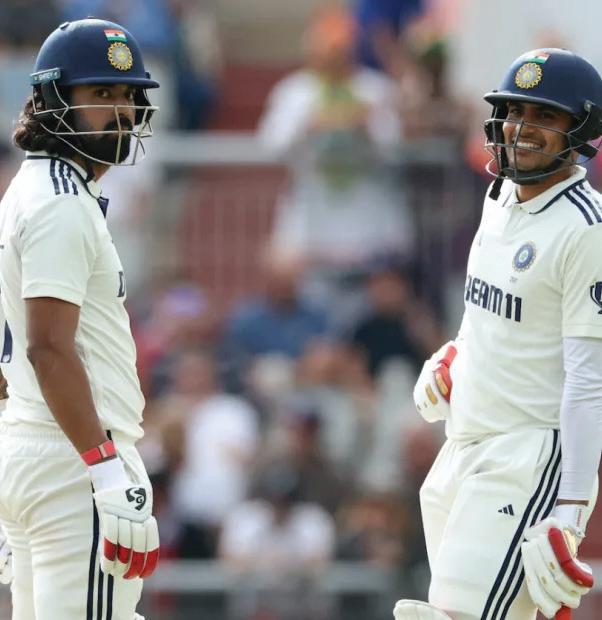
overs in the day. He’d done a fair bit of leg work earlier, meeting even the slightest sign of the balance shifting with extreme prejudice. Mohammed Siraj thought India had run Stokes out in the first over of the day. Stokes punished his optimism by charging at him the next over.
The four runs were incidental. The disdain was the point. Stokes spent a few nervy moments in the nineties but as soon as he got one on his hips, he was able to deflect it off to the boundary behind him - which was the cue for the trumpeter in the crowd to make their mark on this game - and celebrate it with a look up to the heavens and a
THE air on the Essequibo Coast is thick with anticipation as cricket fans ponder the burning question: which team will emerge victorious from the Essequibo zone of the Kares One Guyana T10 Tapeball Blast and secure the final coveted spot in the national playoffs? Sixteen teams are set to clash today, but only one will be crowned champion under the lights at the Anna Regina ground. The battle for Essequibo supremacy features a diverse lineup of teams, including Aurora Knight Riders, Team Evolution, Team Royals, Renegades Cricket Club, The United Crew, Mahdia (Movements Family), Matarkai CPG, Bartica Royals, Moruca Super Strikers, Queenstown (Ariel XI), Inevitable XI, Avinash All-Stars, and Essequibo Jaguars. Adding to the intrigue, the tournament will showcase a blend of local talent alongside prominent West Indies players like Shamar Joseph, Kyle Mayers, and Ronsford Beaton. With so much on the line and a wealth of talent on display, the Essequibo zone promises to deliver thrilling cricketing action.
Who will rise to the occasion and claim the final spot in the national playoffs?
Matches are slated to be played across
sign of tribute to his father, Ged. England’s ninth-wicket stand racked up 95 runs in 97 balls with Brydon Carse almost scoring back-to-back fifties. Their highest total at Old Trafford fell. Then the highest total at Old Trafford fell. Eventually England finished with 669, their fifth-highest in Tests and their best since, oh scoring a paltry 823 against Pakistan in October 2024. Stokes made the last 41 of his 141 runs in 34 balls including all three of his sixes.
He hit one of them so hard - the deterrent at long-off be damned - his follow through had him spun around and almost facing the wrong way on the pitch. He seemed emotional getting to his first hundred in 35 innings, and vengeful after it.
India had 15 minutes to see off before lunch. England clearly wanted to make the most of them. Woakes went around the wicket straight away and that decision yielded great results. Yashasvi Jaiswal couldn’t leave the ball alone. Not with the angle coming into him. He played for it, closing the face, and a peach of a delivery, nipping away off the seam took the edge through to Root at first slip. He fumbled the first time but not the second.
In walked B Sai Sudharsan to become an advert for what happens to a team when they spend 157.1 overs in the middle.
He was undecided against a short and wide delivery and in the end got caught trying to leave it. • Continues on Page 22

multiple venues including Pomona Ground, Richmond Ballfield, Hampton Court, and the Anna Regina Ground, which will host the grand finale under lights.
With Montra Jaguars (Berbice), Eccles All-Stars (East Bank Demerara/West Demerara), and Titans All-Stars (East Coast/ Georgetown) already through, the focus now
squarely rests on who will join them in the national finals. The excitement is palpable, especially with free admission to all venues, making it accessible for everyone to witness the explosive T10 action, which kicks off at 09:00 hours.
Beyond the prestige of being zonal champions, significant financial incentives await
the top performers. The Essequibo zone winner will bag a handsome $300,000, while the runner-up takes home $100,000. However, the real prize awaits at the national final on Sunday, August 3, at the National Stadium, Providence, where teams will compete for a staggering $1.7 million grand prize.
The national runner-up won’t leave empty-handed, pocketing $700,000 along with a trophy and medals, and even the losing semi-finalists will be rewarded with $300,000 each.
The Kares One Guyana T10 Tapeball Blast is made possible by: Kares Engineering Inc, the Office of the President, the Ministry of Culture, Youth and Sport, KFC Guyana, Star Rentals, Banks DIH, ENet, Guyana Lottery Company, Regal Stationery and Computer Centre, Impressions, Avinash Contracting and Scrap Metal, Shawn’s Mini Mart, Giftland Group of Companies, Kris Jagdeo Construction Company, Montra Restaurant & Lounge, Windsor Estates, The New Doctor’s Clinic, GuyOil, ANSA McAL, SuperBet Guyana, Digital Technology, Camille’s Academy, Navin Construction, Demerara Mutual Life Insurance, Continental Transportation, and Environmental & Technical Solutions.